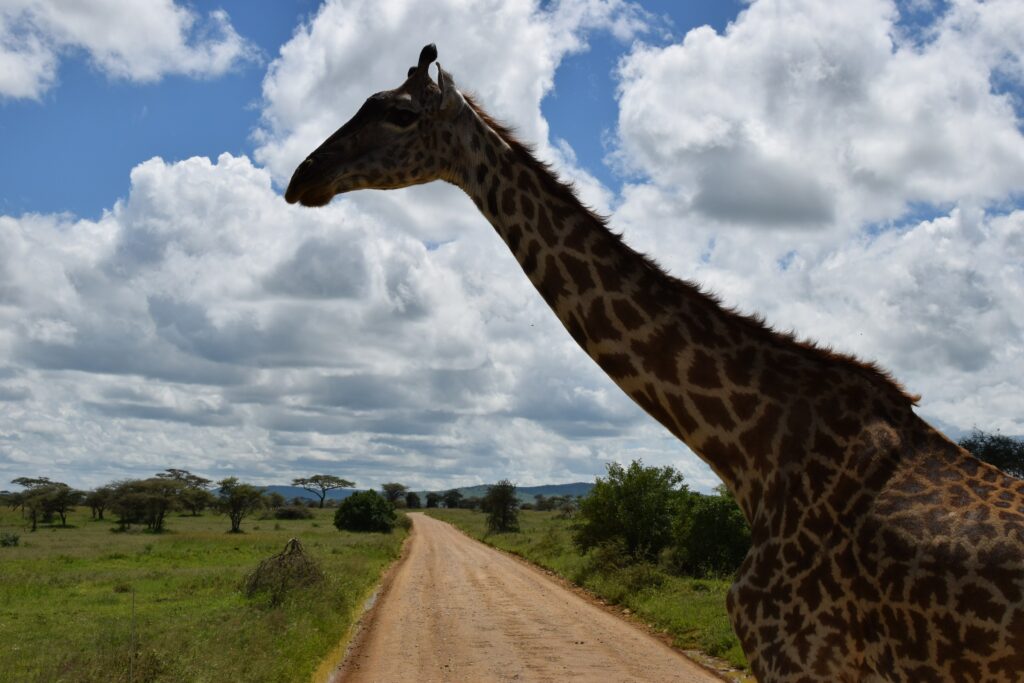
After our Kilimanjaro trek, we took a break for a day and then started our 5-day Tanzania Safari on December 14. We planned to visit Tarangire National Park, Serengeti National Park and Ngorongoro Crater in these five days.
Initially, we had booked a 4-day Safari. But, after hearing the experience of our friends who had done African Safaris, and based on recommendation from Henry at Kilimanjaro Experts, we changed it to a 5-day trip. We added an extra day in Serengeti.
Benno – Our Safari Guide
We had booked our trek and Safari with Kilimanjaro Experts, and Benno was our Safari guide. A day before the trek, Benno came to our lodge for the briefing. He had been a Safari guide for 18 years and was from the Hehe tribe (same as Amoni – one of our porters on the trek).
Benno shared the history and origin of the name “Hehe,” which was quite interesting. You can read more about the Hehe tribe here. Later, he asked us about our preferences and our expectations from the safari.
We knew there were better times for safari (dry season is the best), so we didn’t have high hopes. Also, after the trek, our only expectation was, “Don’t make us walk.” Later, I learned there were walking safaris, but we were done walking, and Benno promised we would get a good “African Massage” just driving in our safari vehicle.
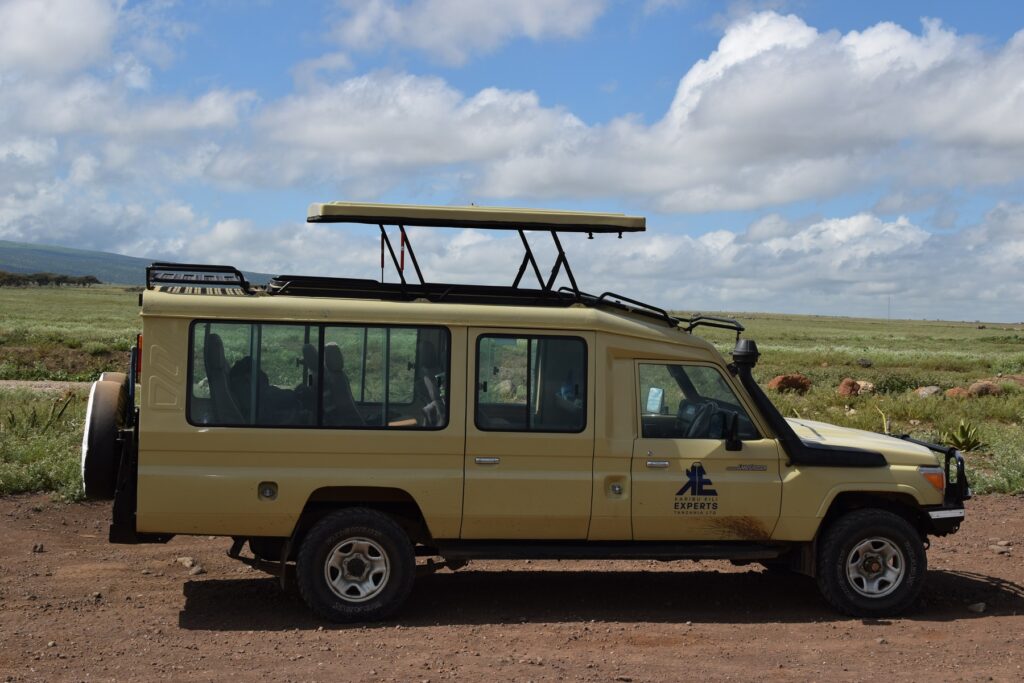
We would be driving in a Toyota Landcruiser customized for Safaris. With a seating capacity of eight, there was plenty of room for four of us, including Benno. Only later on the safari did I realize how convenient this arrangement was, as it allowed us to move around and watch the animals from different sides.
Nikon D5300 – Is there Zoom in this?
A friend who had been on a safari suggested taking a digital SLR camera for the safari rather than just using our phones. In 2018, we purchased a used Nikon D5300 24.2 MP and hadn’t used it much. So, as we started the safari, one of the first questions I had for Benno was, is there Zoom in this camera to take a closer shot?
I went through all the options on the camera and could only see the option to zoom in on the photos we had already taken. At our first lodge, once I had wifi, I also searched online. Finally, I realized these cameras have no zoom without the zoom lens, unlike our phones or the point-or-shoot cameras we had before. Noob redefined.
So, all the photos I share in this blog post are taken in an Auto mode without any zoom lens and have not been edited/auto-corrected using any software. If I have zoomed in on a photo, I will mention it in the caption.
Day 1 – Tarangire National Park
After breakfast, Benno came to pick us up, and we made our way to Tarangire National Park. This park is in Tanzania’s Manyara Region and is 2850 square kilometres – about the size of Metro Vancouver. It is about two hours drive from Arusha, most of which is on paved roads. The last 15-minute drive to the gate is on a gravel road. After the registration and a bathroom break at the gate, we entered the park.
A herd of impalas and some waterbucks were the first animals we sighted. As we drove ahead, some impalas were close to the road.
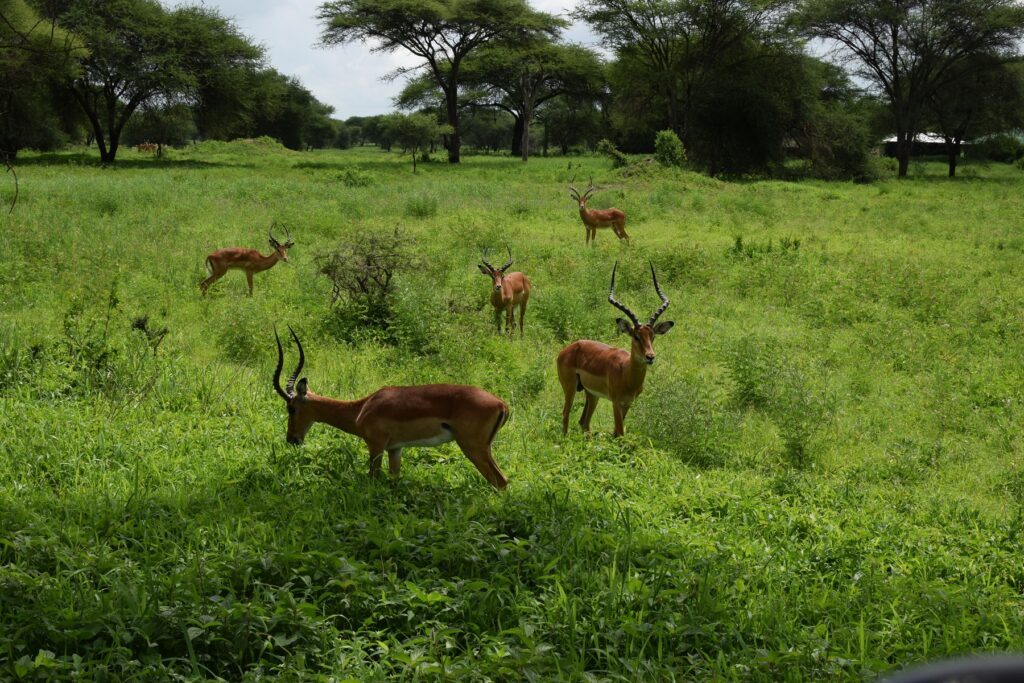
As we continued our drive, we saw a warthog and vervet monkeys. As other safari vehicles passed, Benno would have a quick chat with other guides and ask about animal sightings. All the safari guides also carried a radio. They would inform other guides of any sightings of animals that are hard to spot.
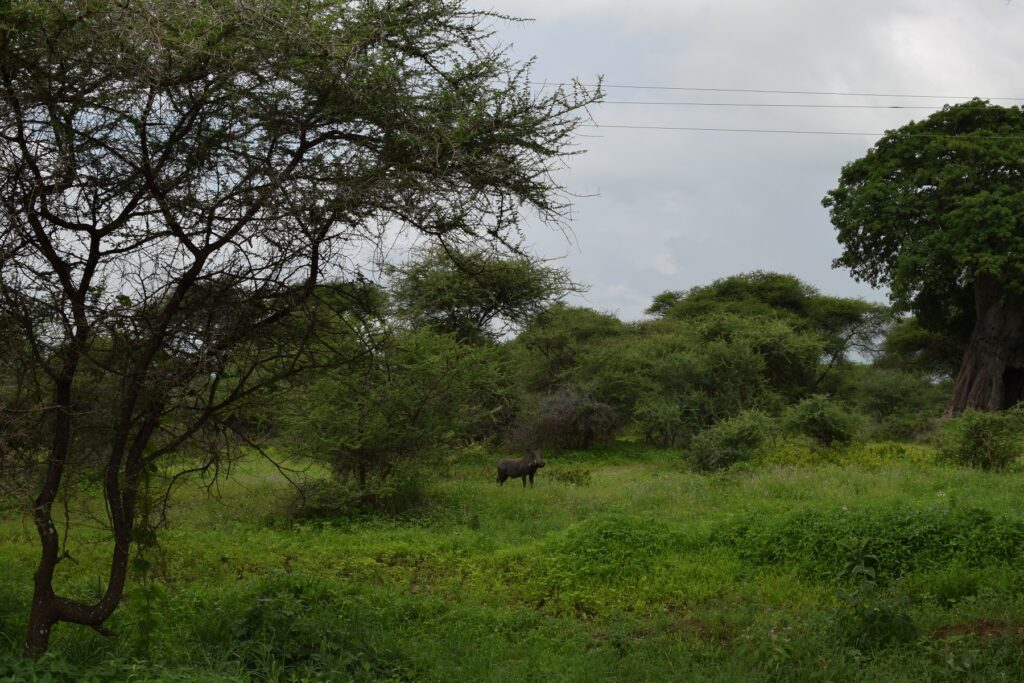
Lions
About half an hour into our drive, Benno got excited about something on the radio and rushed to a spot. A few other vehicles were already parked and were looking toward an acacia tree. Benno said there was a lion and a lioness behind the tree.
This was our first safari, and coming in the short wet season, we had low expectations. So, we were happy to see the lions so close (quite common in African safaris, but new to us). We spent about an hour at the same spot, watching the lions.
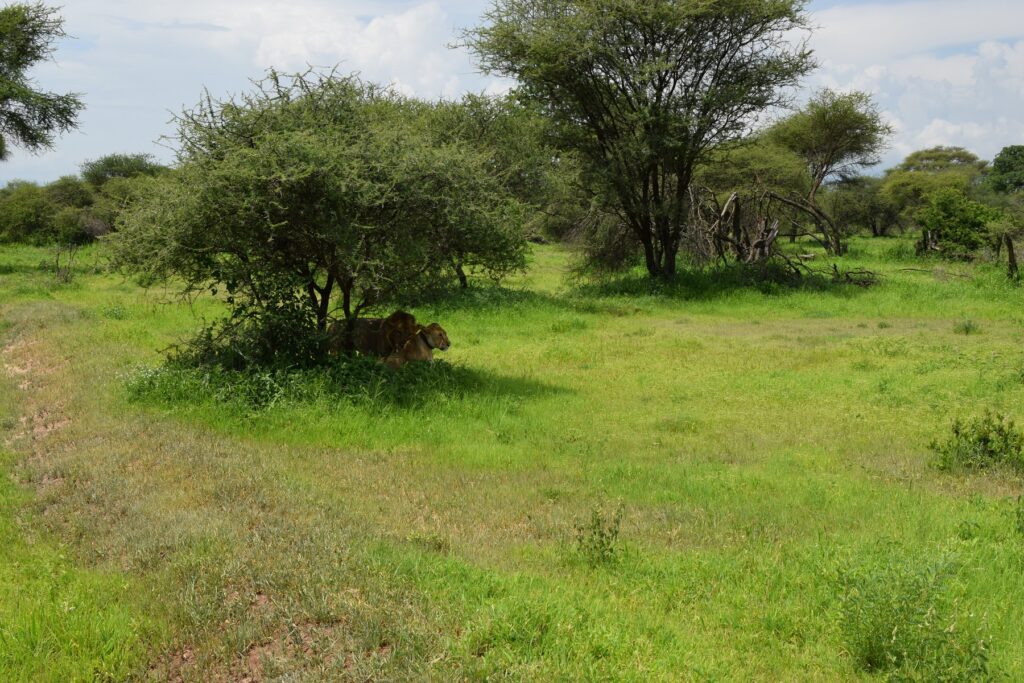
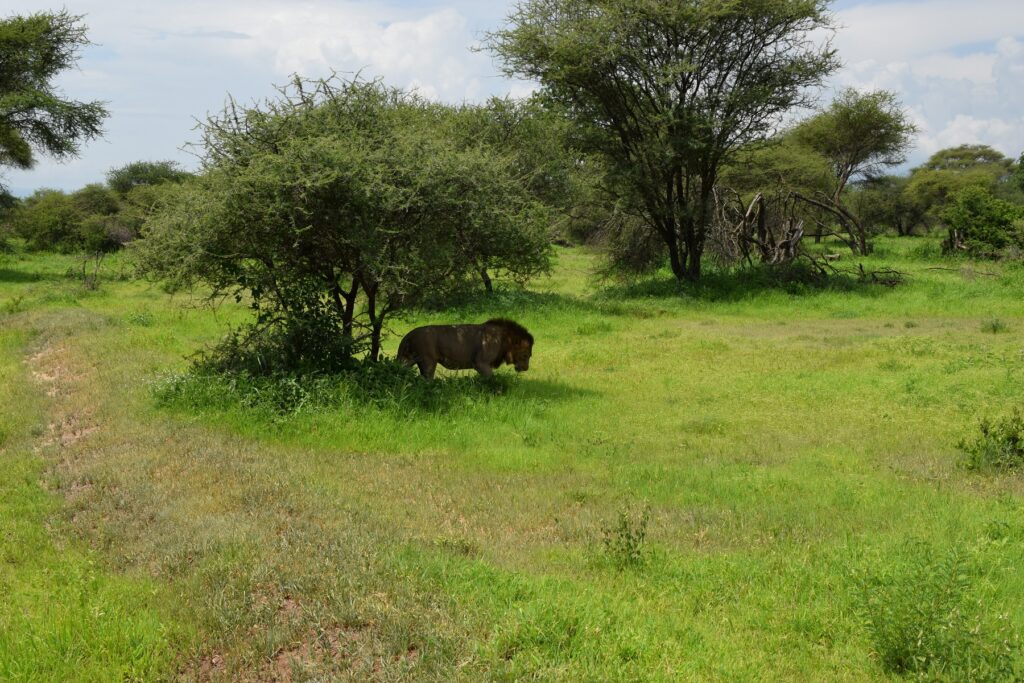
The lion and lioness had separated from their pride for privacy but couldn’t escape the safari tourists. Lion tried to make his move, but the lioness was not in the mood and would scowl him off. Lioness also had a radio collar used for monitoring.
On our way to the picnic spot, we saw an ostrich, giraffes, monkeys, impalas, and waterbucks. Two jackals were chasing a rabbit, but it managed to escape.
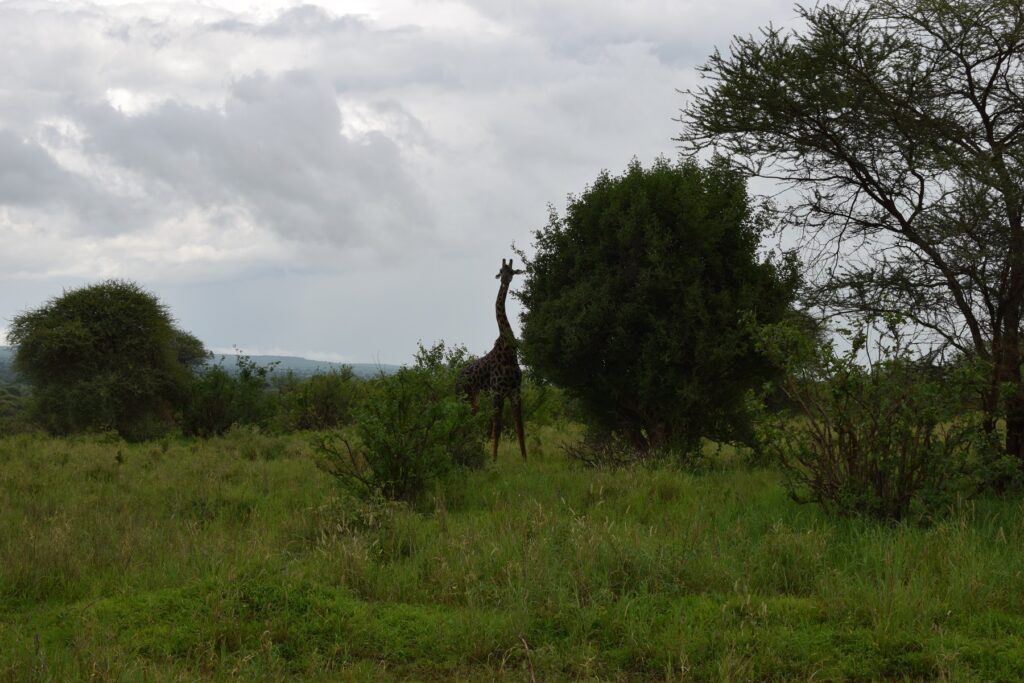
Tarangire River
Around 1:30 pm, we arrived at the picnic spot and had a beautiful view of the Tarangire River. Many animals can be found near the river during the peak dry season. It is also an excellent opportunity to see the predators hunt. In December, we could hardly see any animals along the river. But the view was beautiful.
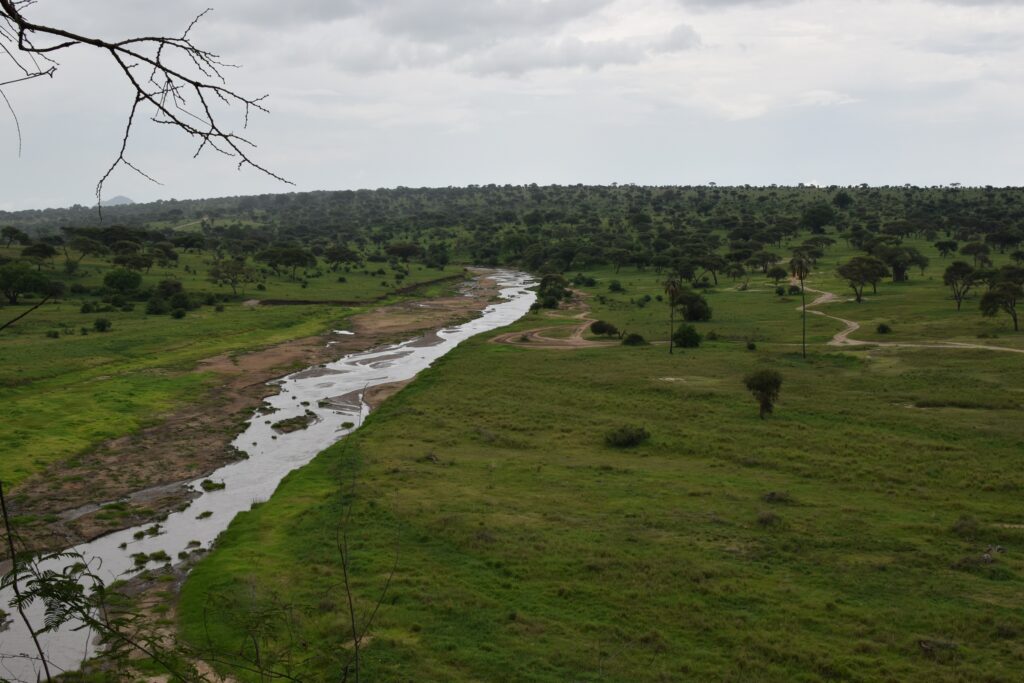
There were lots of monkeys at the picnic spot, and we constantly had to guard our food. Unfortunately, some tourists were feeding the monkeys. This leads to more aggressive behaviour in the long term.
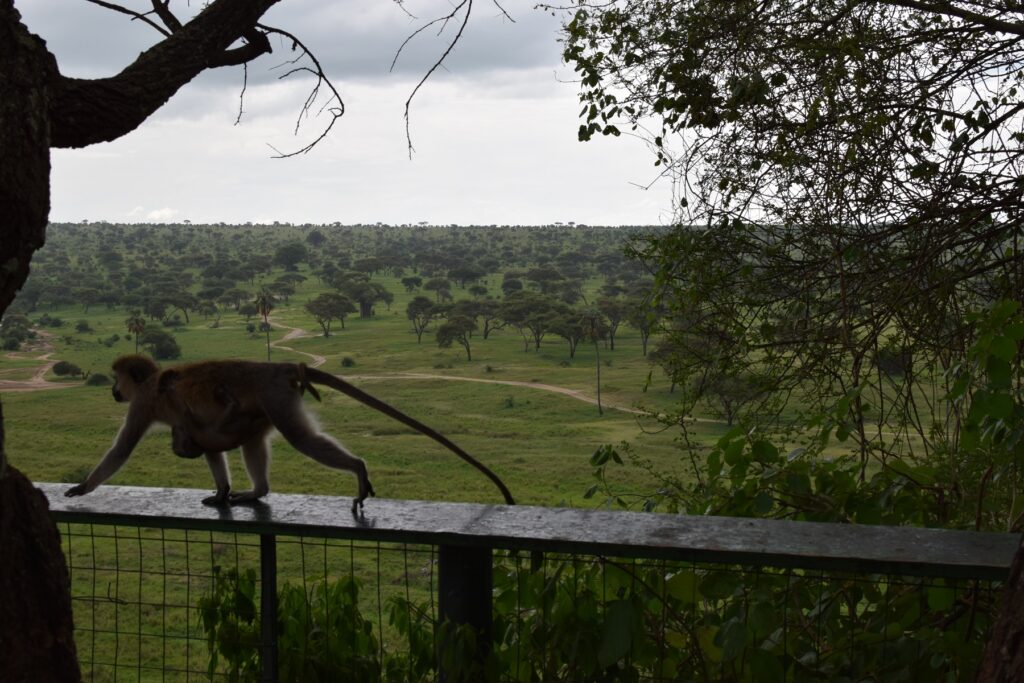
Benno had picked up boxed lunches for us, including a sandwich, boiled egg, apple, juice box, a small cake, chocolates and a few other snacks. This would be our typical lunch for the rest of the week.
As we were getting ready to leave, Kasturi spotted a herd of elephants at a distance. After lunch, we made our way to the other side of the park, where we had seen the elephants. Unfortunately, the elephants had already passed by the time we arrived.
Leopard
Benno was now keenly following the chatter on the radio. But there were no major sightings. Kavya spotted a leopard turtle on the road, and soon after, the radio lit up again. This time it was a leopard.
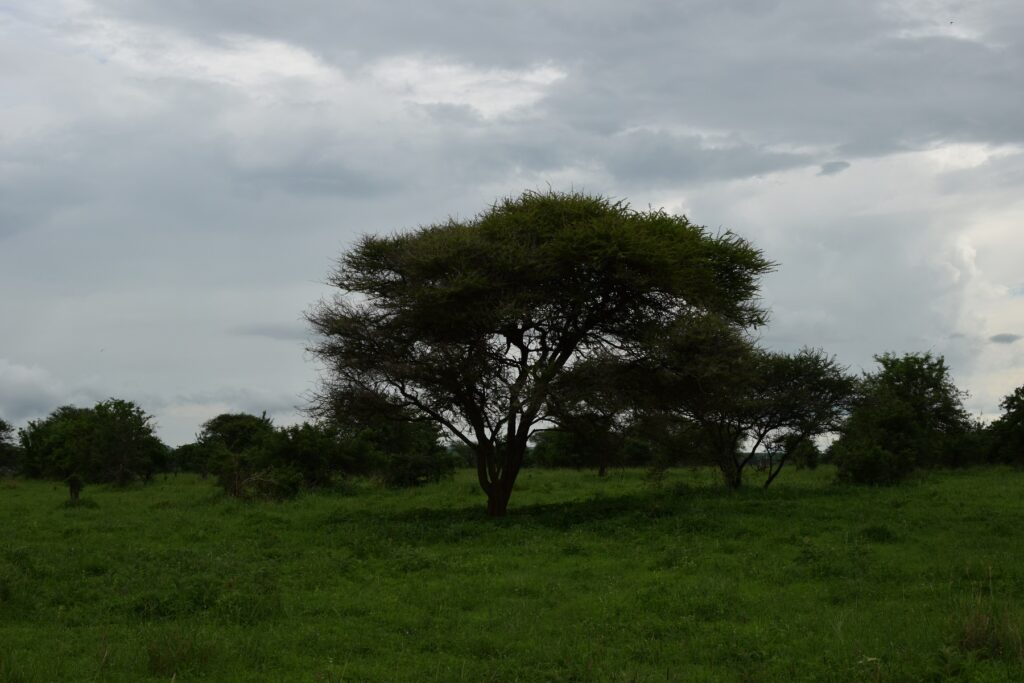
As we got to the sighting spot, there were multiple vehicles parked. Benno pointed to the tree and handed us the binoculars. We could barely see a leg hanging from the tree and had to use the binoculars to get a better view. So, kudos to the individual who spotted the leopard. We waited some time, hoping the leopard would come down from the tree. But no luck.
Elephant
We resumed our search for elephants; thankfully, it didn’t take long. First, we saw a herd with some baby elephants, and later, we saw a big male elephant making its way to a watering hole.
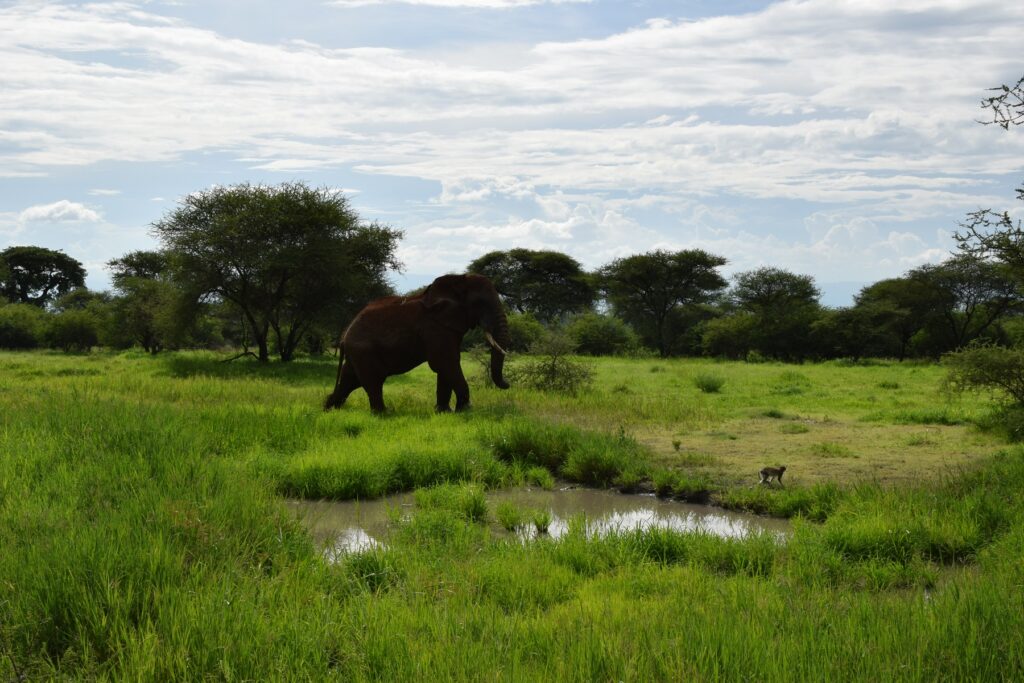
After drinking and splashing some water, the elephant went to a nearby tree, rubbing its trunk and tusk against it. Then it came close to the vehicle. A bit too close.
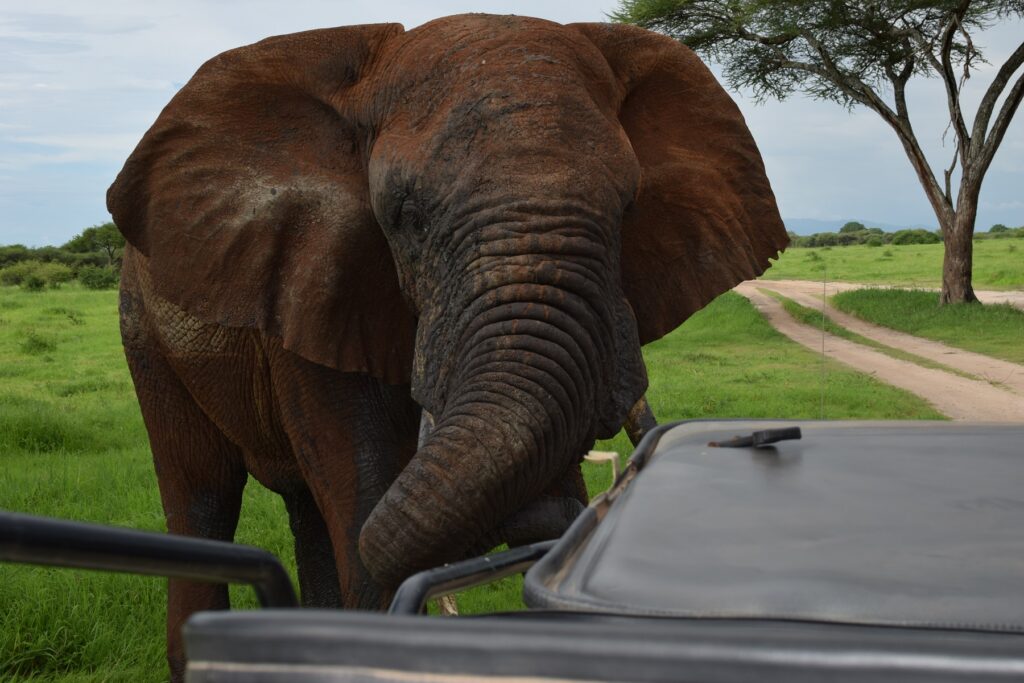
At this point, Kasturi asked Benno to move out, but he just asked us to stand still. It will be okay. The elephant stood there, probably saw the fear and admiration in our eyes and turned around. It went back to the tree for more trunk and tusk rubbing.
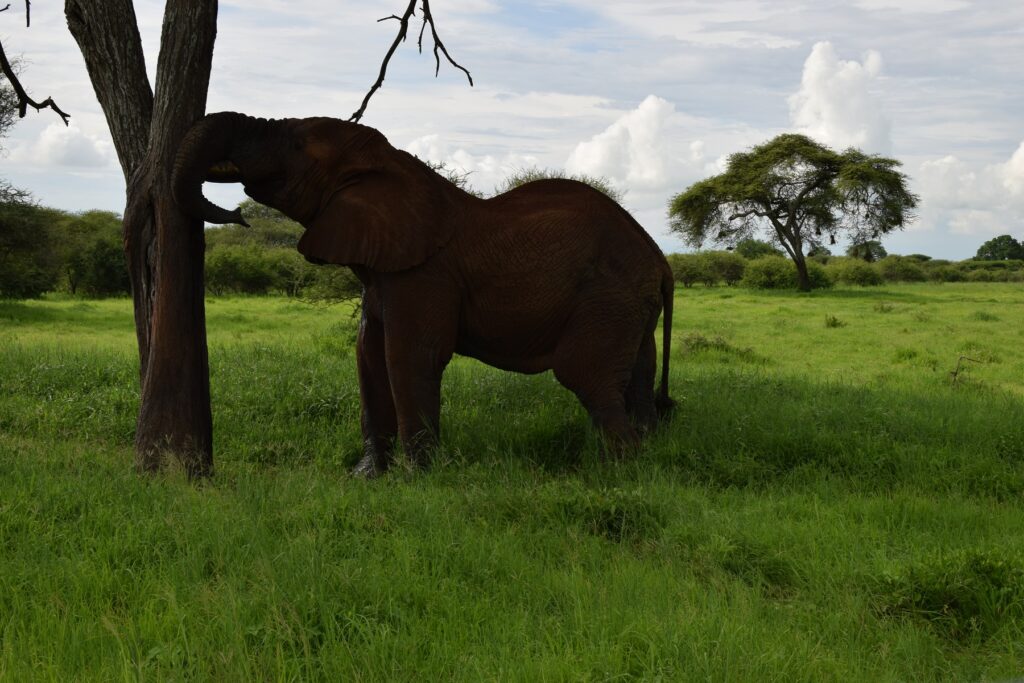
Soon, the elephant stopped and turned towards us. This time, Benno turned on our vehicle. As per Benno, the elephant’s body language indicated the “show was over,” and we had to move out. Before the elephant picked up speed, we were already at a safe distance and then drove away. This was one of the most exhilarating experiences for us as a family, and thanks to Benno for making it happen.
Country Lodge Karatu
It took us just under two hours to arrive at Country Lodge in Karatu. We would stay here for one night and then head to Serengeti via Ngorongoro Conservation Area.
We had booked a budget safari and expected accommodations like the Outpost Lodge in Arusha, but the Country Lodge was another level. We got a warm towel and welcome drink at the check-in counter. The staff was super friendly. It was a huge property with twelve cottages, a swimming pool and a well-maintained garden.
The room was spacious and had a fireplace. The washroom was as big as one of the rooms in our previous apartment. We were the only guests to stay on the night of December 14 and received all the attention from the staff.
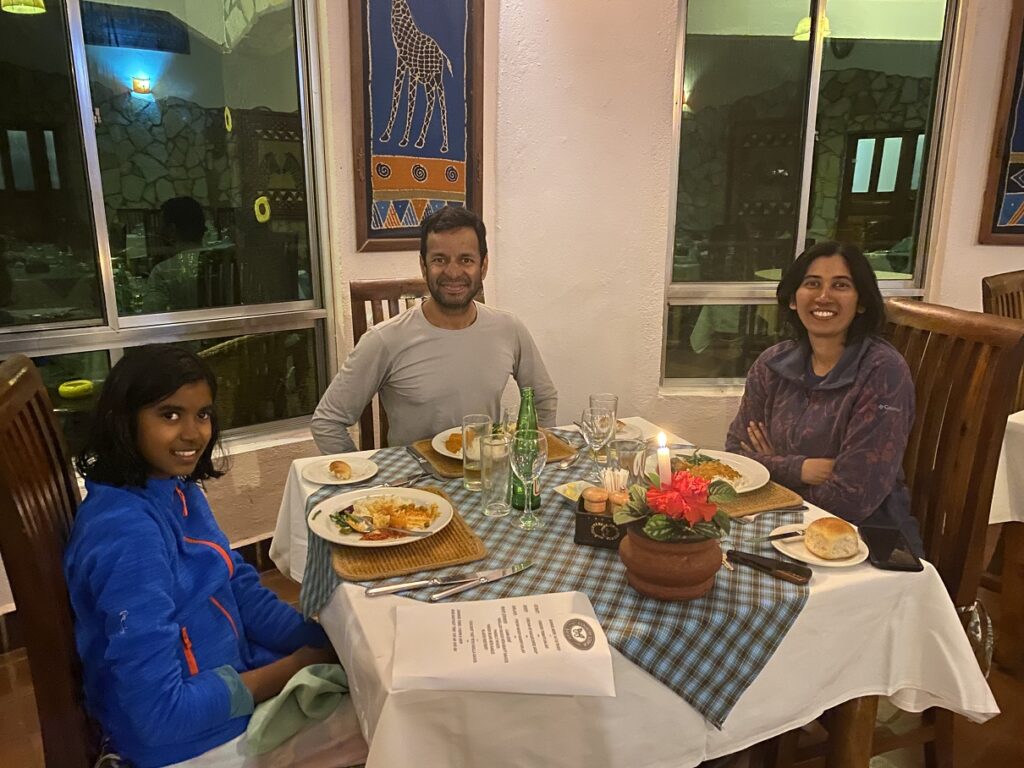
It felt awkward as we sat down for dinner in the huge dining area. We still had a heavy tan and wore our (washed but) hiking clothes. Kavya said the lodge was too fancy for us. After dinner, we got some firewood from the staff and enjoyed a cozy night in our room.
Day 2 – Serengeti National Park via Ngorongoro Conservation Area
After breakfast, we left Karatu around 8:30 am. It was a short drive to the entrance of the Ngorongoro Conservation Area. Due to the fog, the visibility was limited, so we didn’t stop at the crater viewpoint on the south side of the crater. We drove past Rhino Lodge, where we would return for our final night’s stay.
Malanja Depression
This drive through the Ngorongoro Conservation Area goes through a region called Crater Highlands. As we drove along the west side of the Ngorongoro crater, we had Malanja Depression to our right.
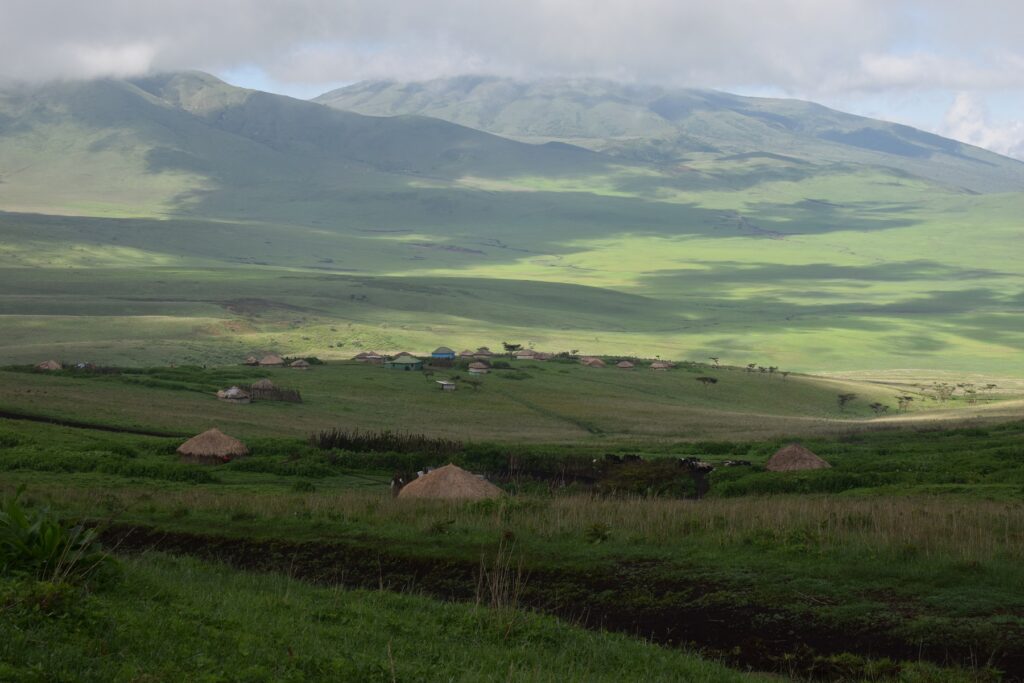
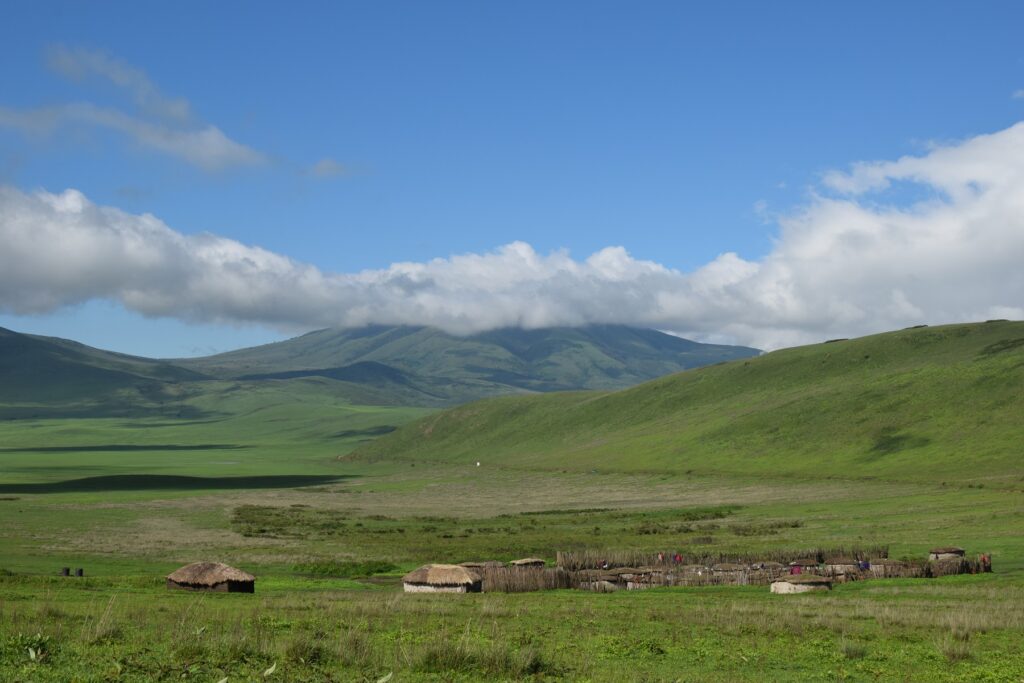
Although cloudy, we had great views of the Maasai settlements in the Malanja Depression and the Sadiman volcano in the background. Some tours take you to one of these Maasai villages, but it is a tourist trap. Based on our friend’s experience in Kenya, we had not booked such tours and didn’t like the concept in general.
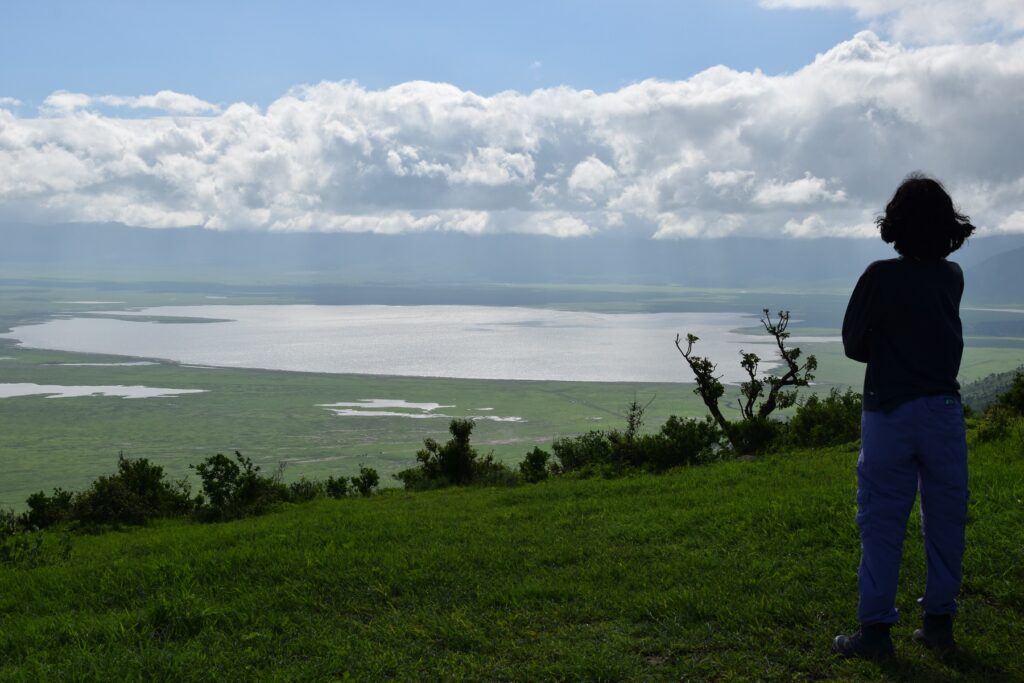
We took a short detour to go to the Ngorongoro crater viewpoint on the west side of the crater.
We saw zebras and giraffes as we drove down from the Crater Highlands to the Serengeti. One of my favourite pictures from this area is that of the lone giraffe on the horizon of a lush green hill.
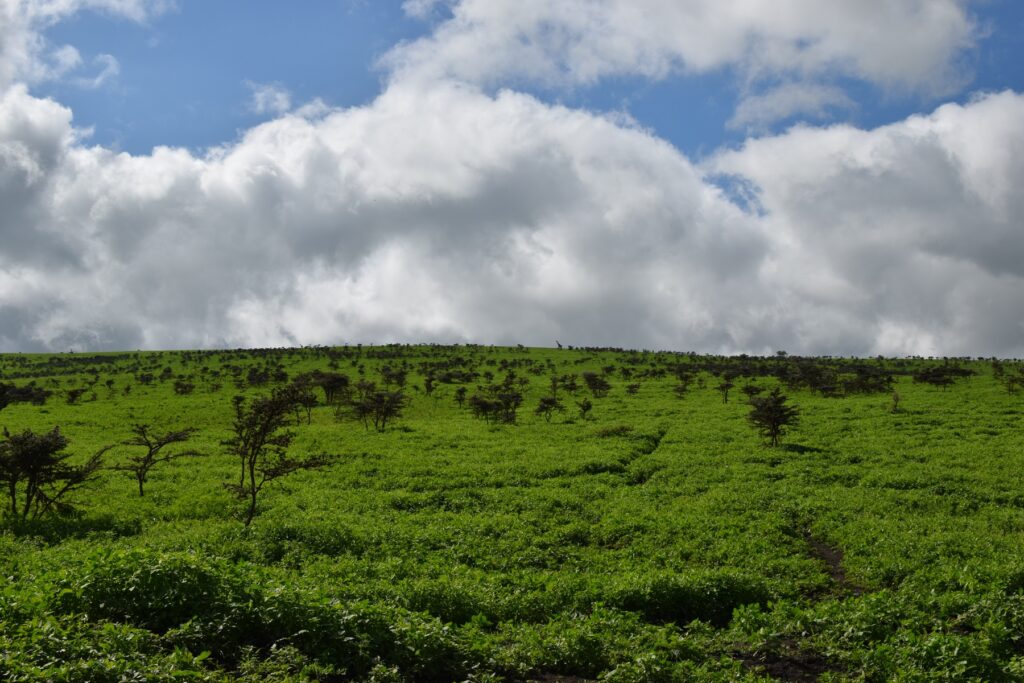
Tower of Giraffes
But a few minutes later, we experienced what I consider one of the highlights of our 5-day safari. A tower (term for a group) of giraffes walking/running across the plains and then crossing the road. Seeing about 50+ giraffes, the tallest land mammals on the planet, was an unforgettable experience.
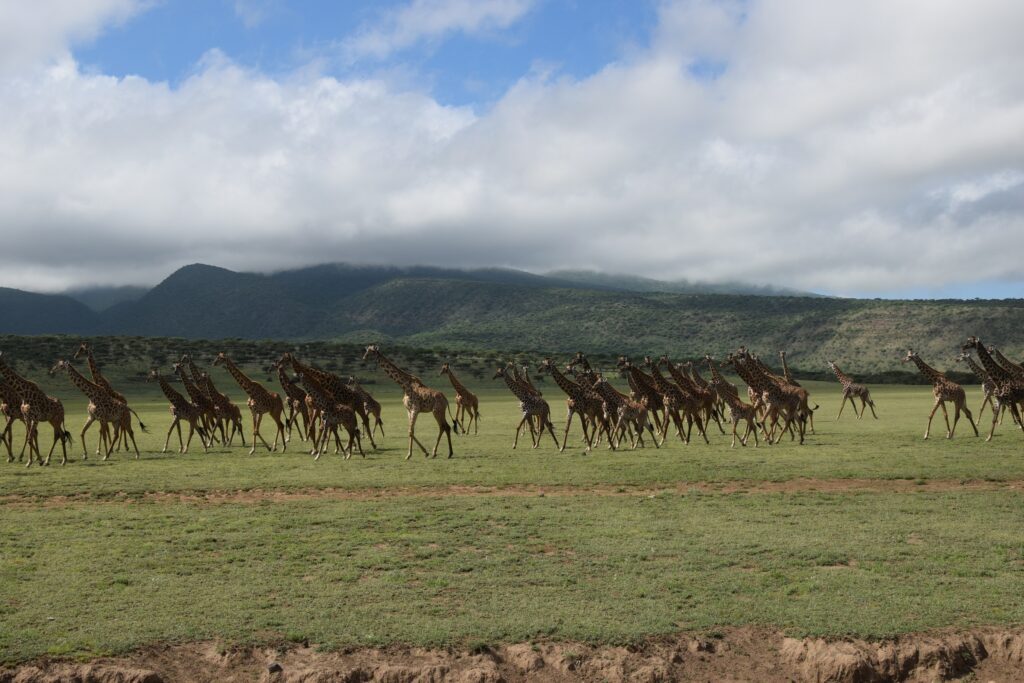
Benno said that in his eighteen years as a safari guide, he has seen so many giraffes together only three times. We were just lucky to be there at the right time and at the right spot.
Soon, we stopped at the Olduvai Gorge Monument and Museum for a bathroom break. Olduvai Gorge is a Unesco World Heritage site where fossils of some of the earliest human ancestors were found. The fossils date back to 1.84 million years!
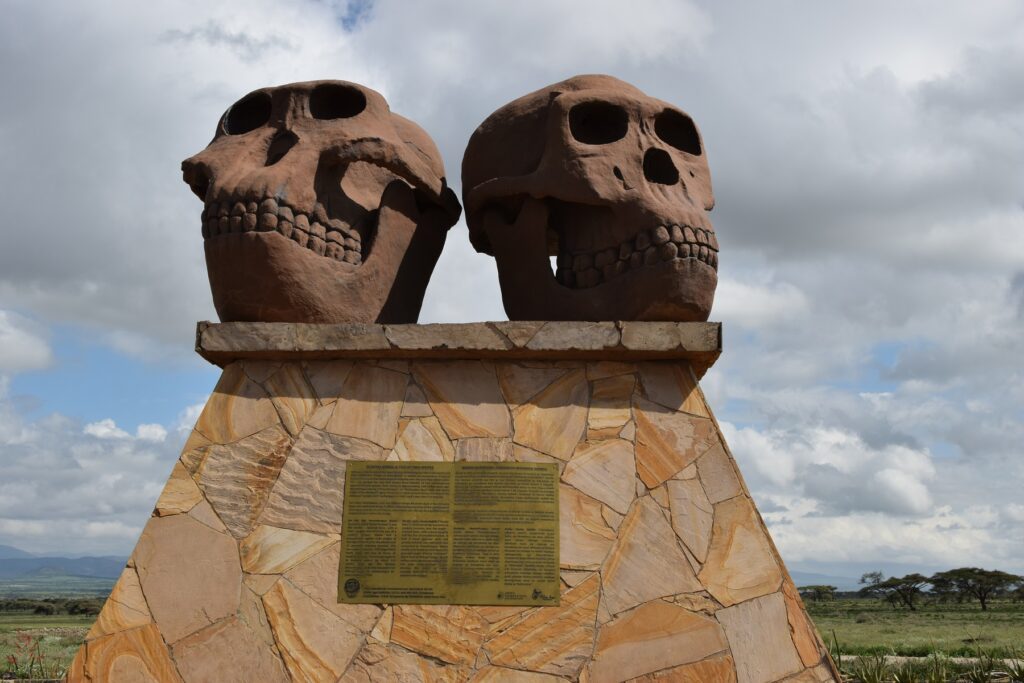
Confusion of Wildebeest
As we approached the Serengeti National Park gate, it was time for wildebeest – thousands and thousands of them. Benno said about two million wildebeest move around as part of the great migration. In December, the wildebeest are found in the east/southern plains of the Serengeti.
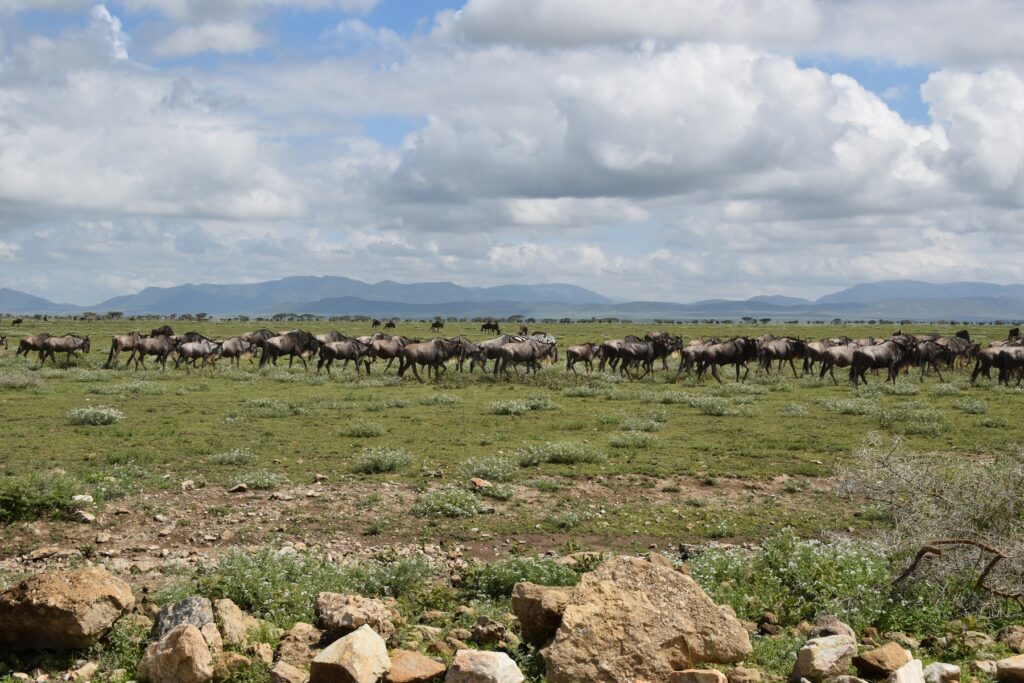
Expert Africa has a great page on wildebeest migration with month-by-month guides and excellent resources. Here is a video from Expert Africa –
A herd of wildebeest is called “confusion of wildebeest.” You can read more about the collective nouns for animals here. My favourite – a “dazzle of zebras.”
The zebras, gazelles, impalas and a few other animals are also part of the great migration. The zebras and wildebeests can be seen together, with thousands dotting the plains.
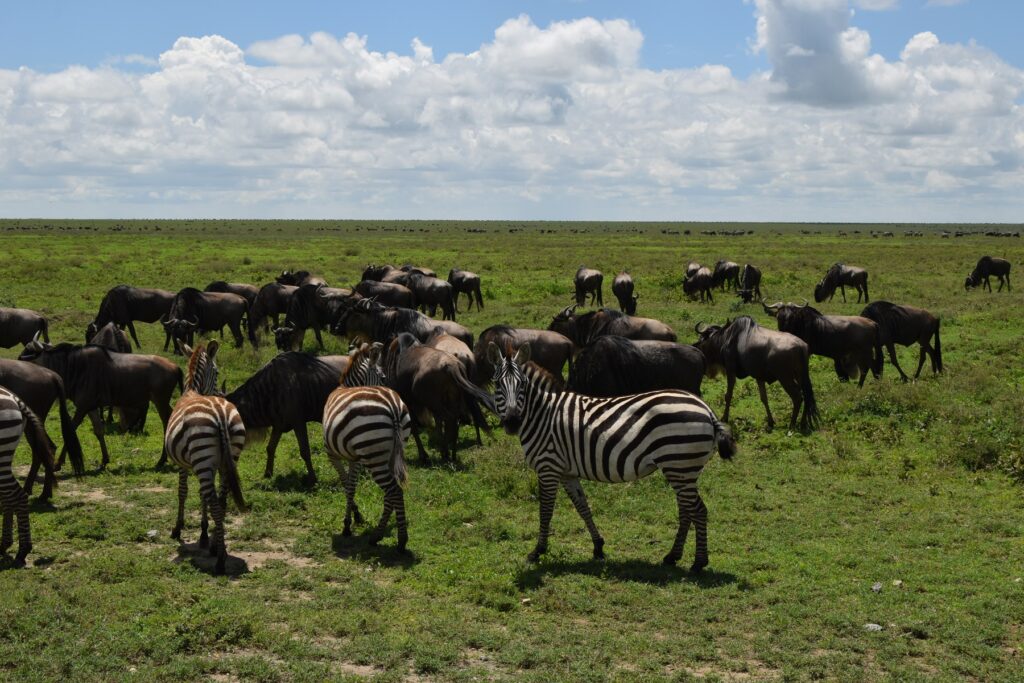
In this section of the Ngorongoro Conservation Area-Serengeti National Park, we also saw gazelles, hyenas, vultures and many other birds.
Lions
Our first lion sighting of the day was before our lunch break. A pride of lions was resting right next to the road, with cubs in the pipes to the right. Vehicles on the other side said a few cubs were also in the tunnel under the road, but we couldn’t see them.
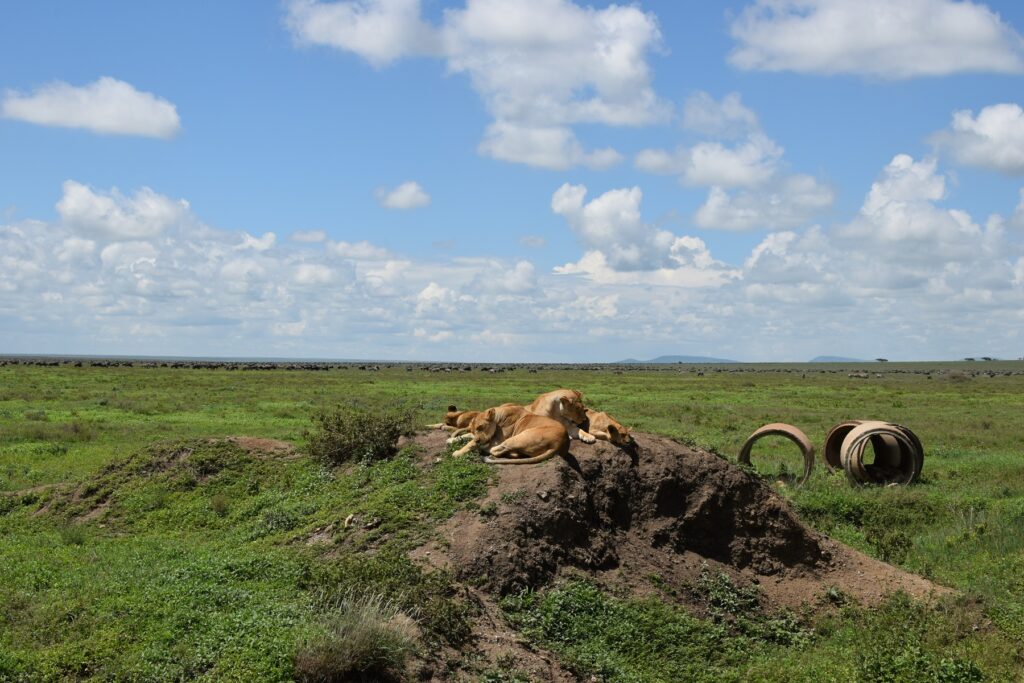
About 18 km past the Serengeti National Park gate is Naabi Hill, the checkpoint for all the incoming/outgoing vehicles into the park. It also has washrooms and is a great lunch spot.
Our next lion sighting was about 10-15 minutes after we left Naabi Hill. A few lions were under an acacia tree, a few in a shrub and at least one more on a solar panel on the other side of the road.
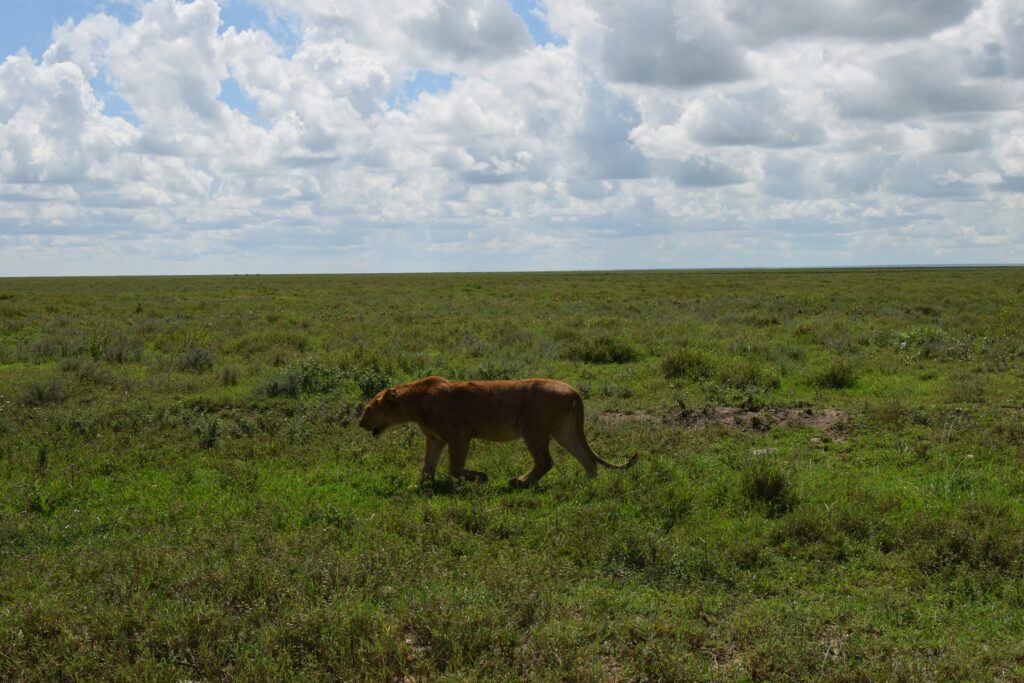
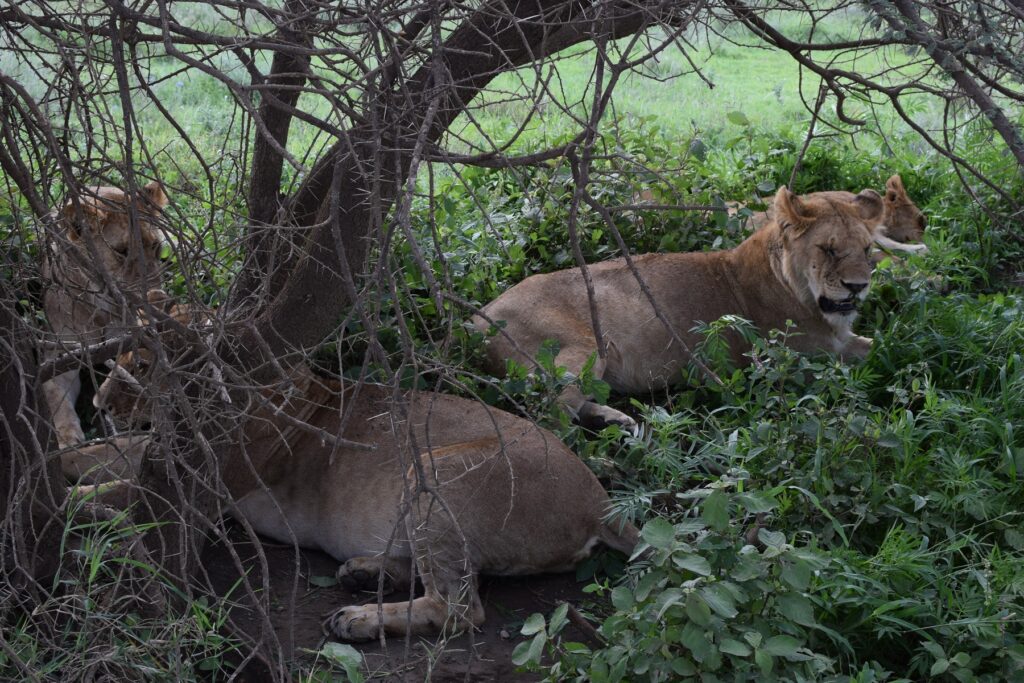
As other vehicles left, Benno drove us close to the acacia tree. It was unbelievable to see these beasts that close. After about 20 minutes, we left and continued our drive into the Serengeti – meaning endless plains in Swahili.
The Hunt
Benno heard something on the radio, and we left the main road for one of the smaller unpaved roads. We saw other vehicles ahead and a few others following us. Benno was reluctant to share much information as he later shared that sometimes the chatter on the radio doesn’t lead to a sighting, or the animals have already moved on by the time we arrive.
After a bumpy ride with lots of “African massage,” we arrived at an area with boulders. A lion was slowly walking in the direction of a zebra. There were actually two lionesses lying low and hiding in the grass. But the zebra saw the lion and just stood there. I don’t know if it also recognized the lionesses, but one lioness then just stood up. The hunt was called off.
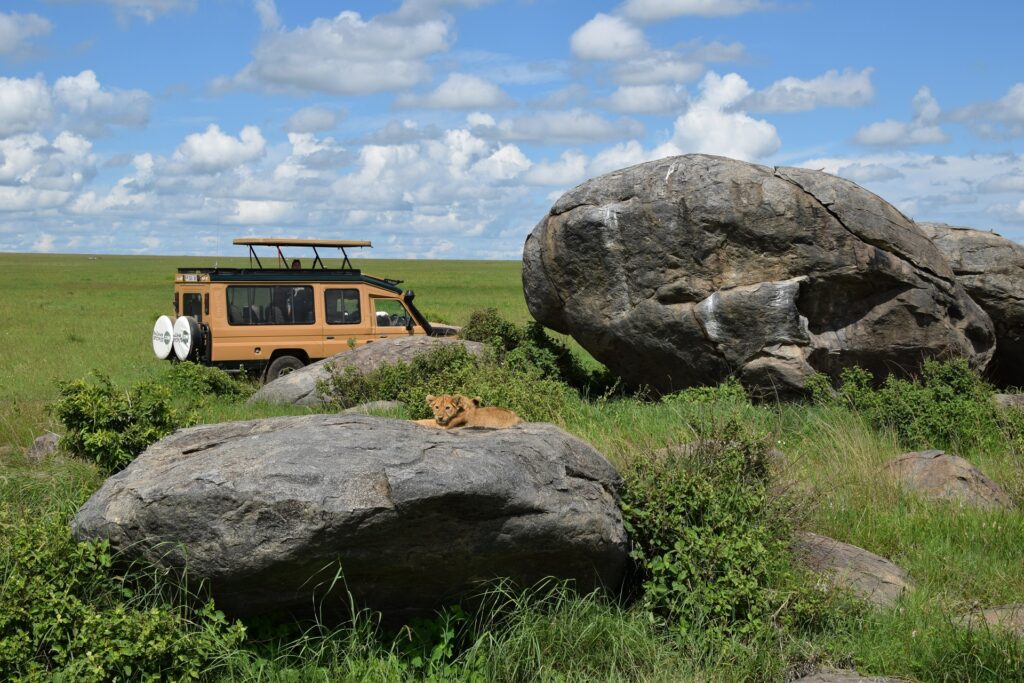
Meanwhile, we realized that at least two cubs were resting on a boulder. After playing outside for a while, the cubs hid under the boulder.
The drive to get back on the main road was tricky, and twice, we encountered vehicles stuck in the mud. Even though all the vehicles are 4×4, recent rains have worsened the road conditions. It was quite a team effort to get these vehicles out. Given these tricky road conditions, some guides prefer to stay close to other vehicles.
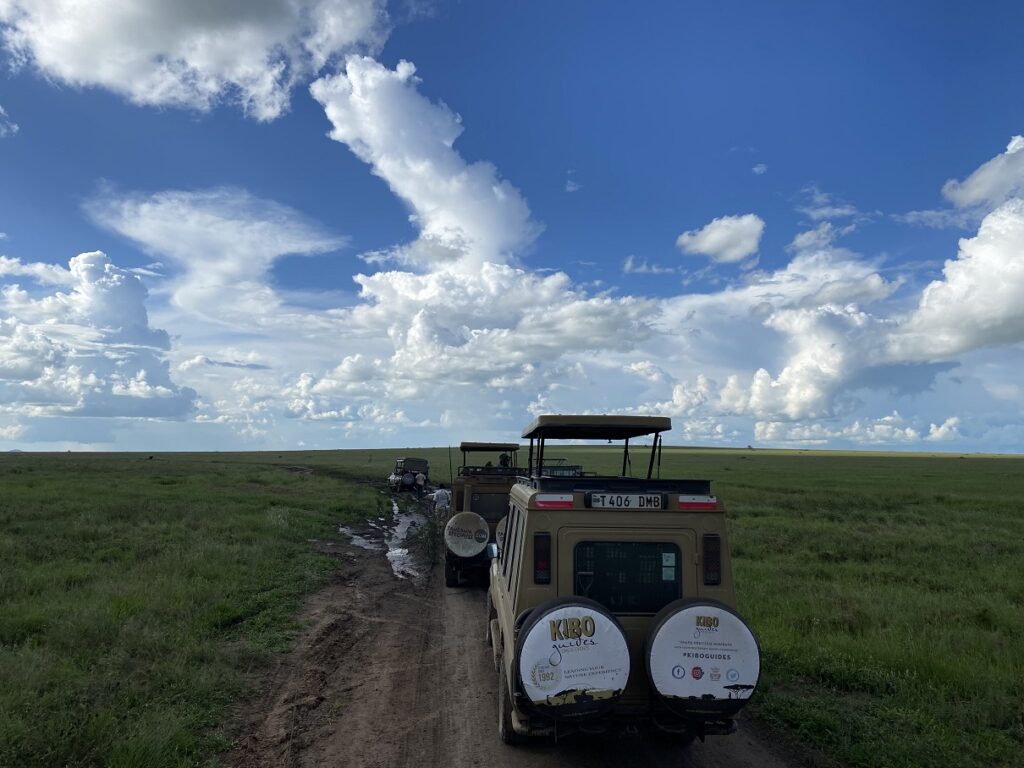
Leopard
It was close to 4 pm, and we were still navigating the back roads. I had lost the sense of direction, but Benno knew what he was doing. We saw a few vehicles slow down and stop at a spot, so he took us there.
People were pointing towards a bush, but we couldn’t see anything. After a while, there was some movement, possibly triggered by a vehicle that got too close. It was a leopard.
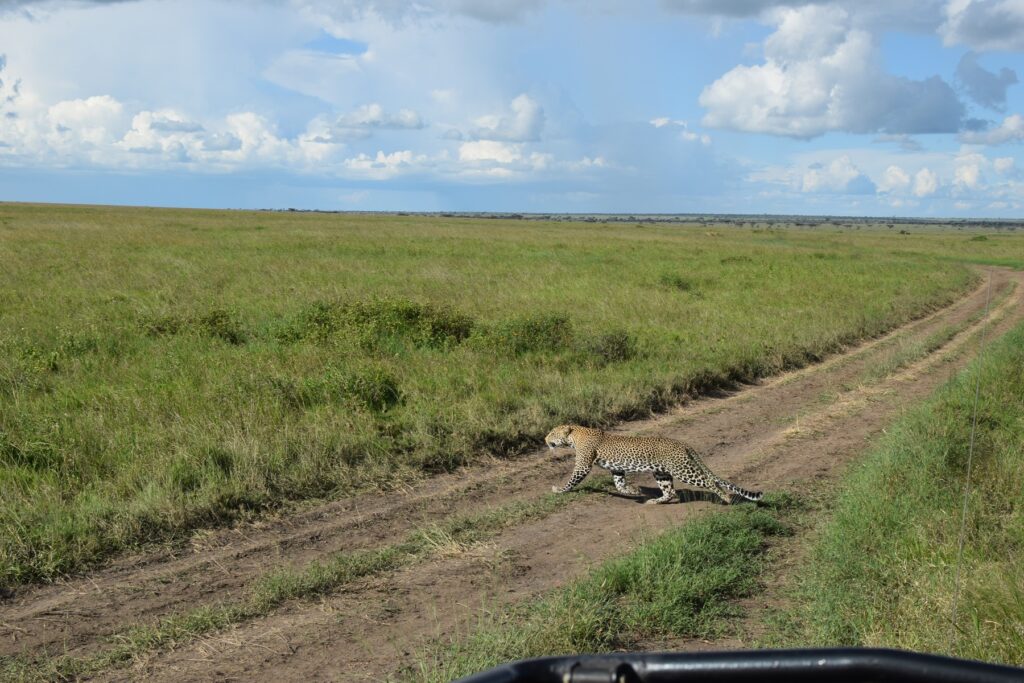
Yesterday, we saw one through binoculars, but today, we had a clear view of this beautiful beast as it crossed the road right in front of our vehicle.
As we were heading back to the camp, we rushed to a site with probably 10-15 other vehicles to see a cheetah. But, due to the distance and the time of the day, we could barely see anything and needed binoculars. It was sitting on a mound, looking at something. Our final stop of the day was the Hippo Pool where a “bloat of hippos” appeared lick rocks in the pool.
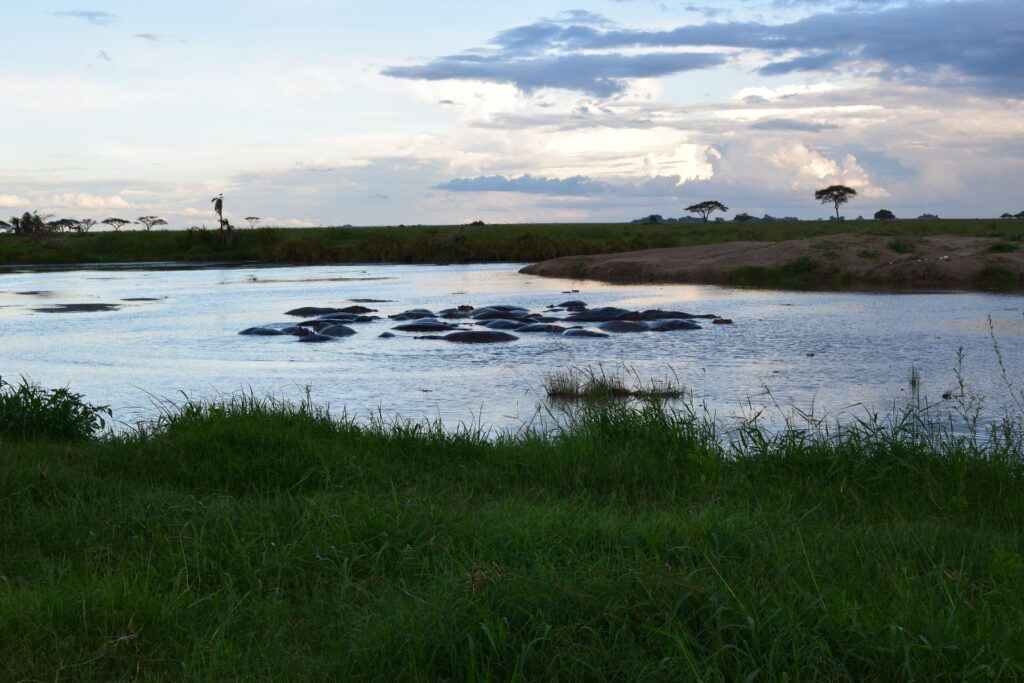
Signature Serengeti Camp
Around 6:15 pm, we arrived at Signature Serengeti Camp – a new property that opened in 2023. The staff was super friendly, and we got a welcome drink as we sat outside the dining area, enjoying the view.
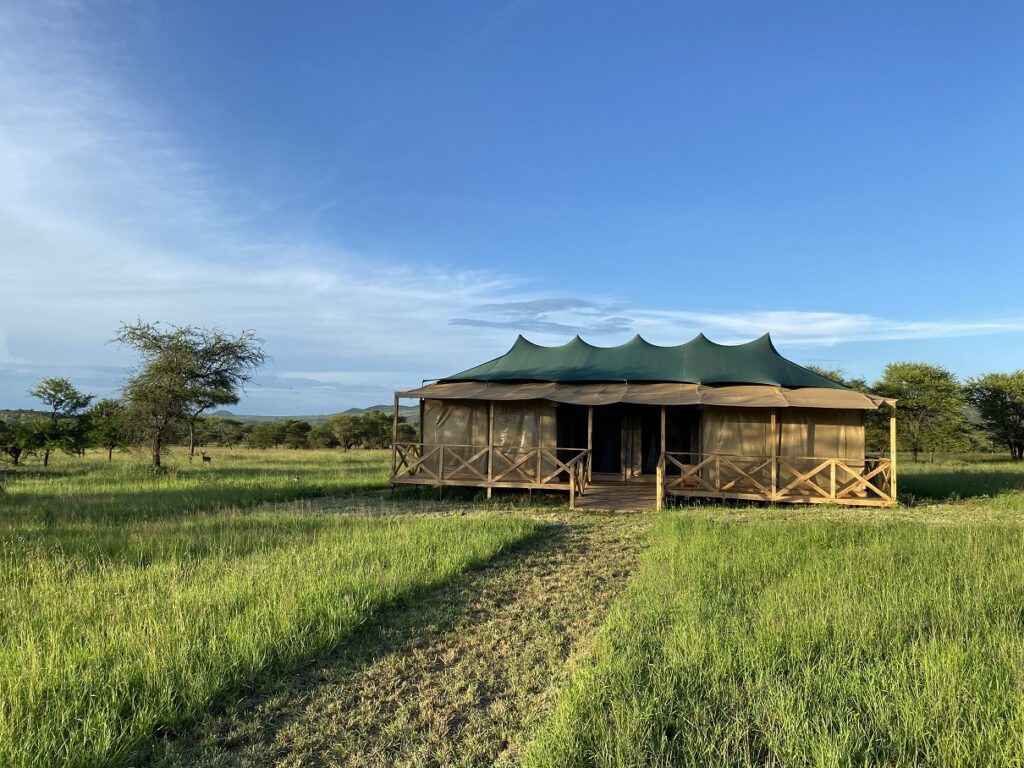
Later, the staff gave us a quick overview of the property and handed us a radio. Anytime at night, we would have to call one of the staff members on the radio to escort us to the dining area and back to our tent.
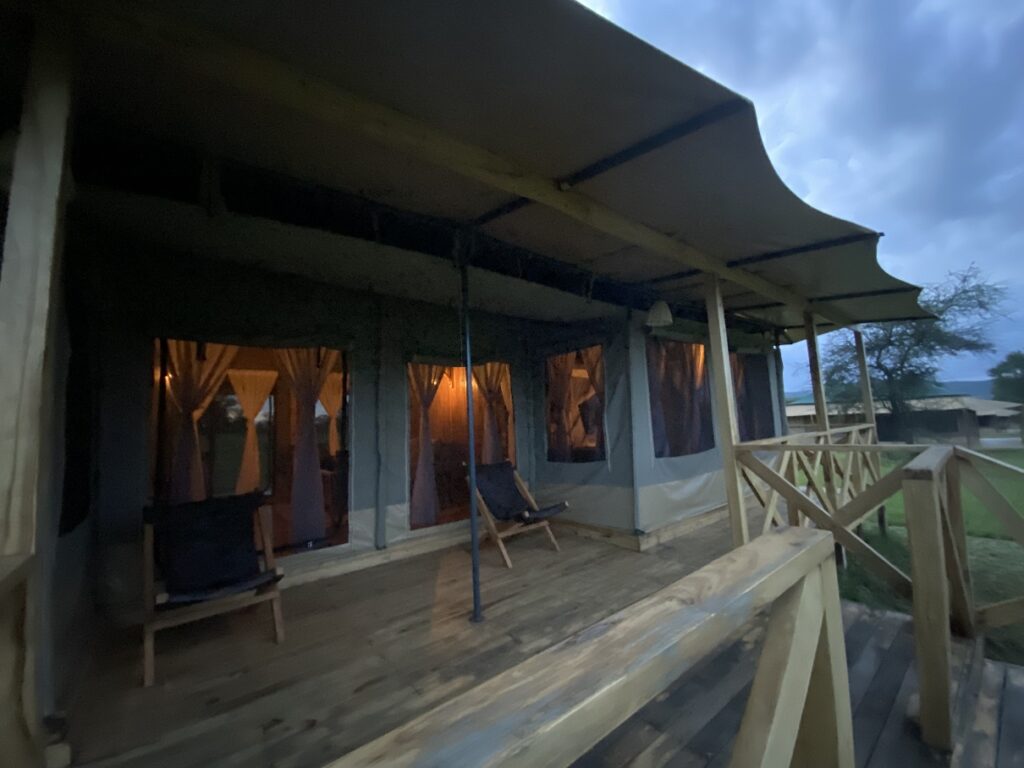
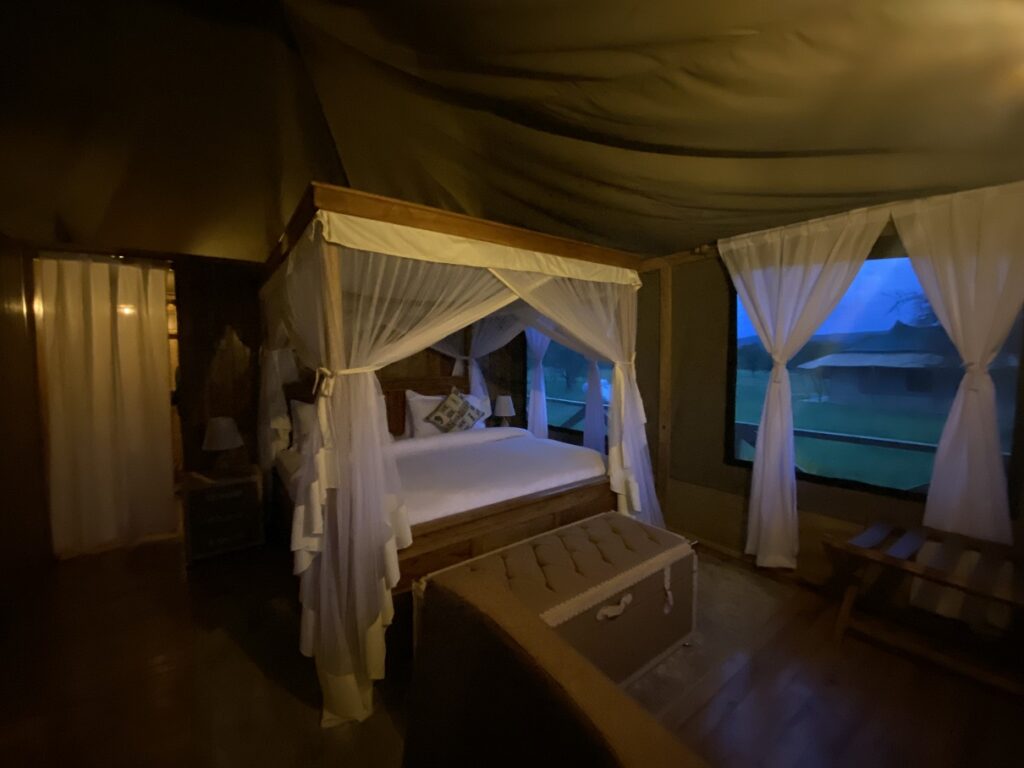
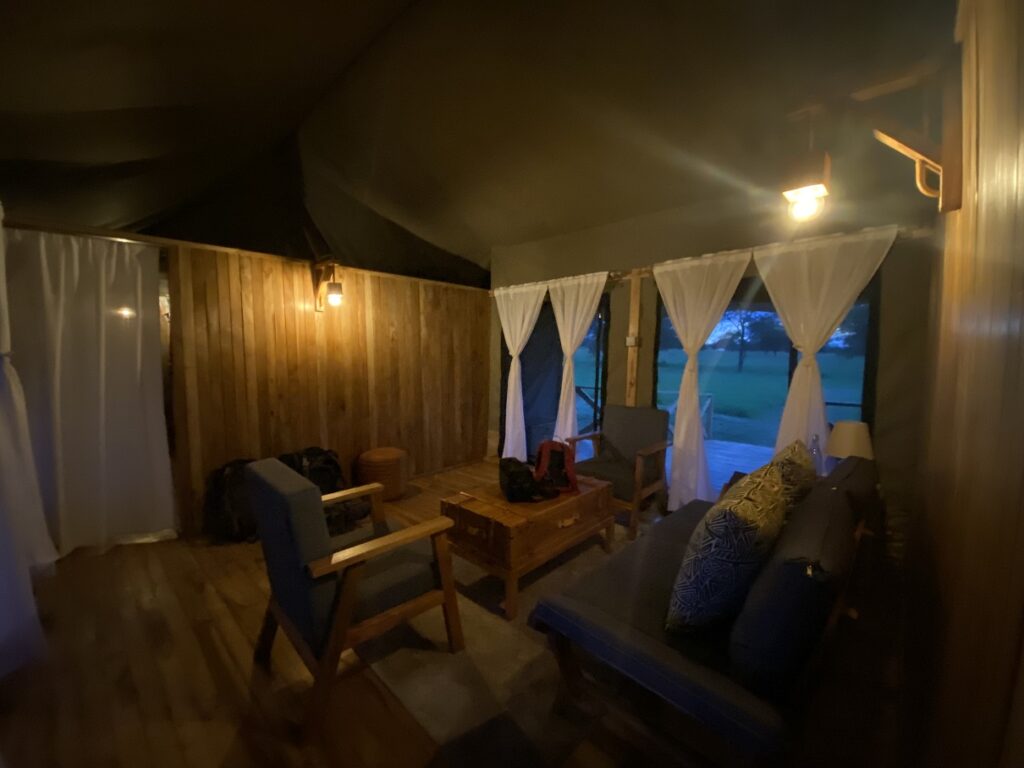
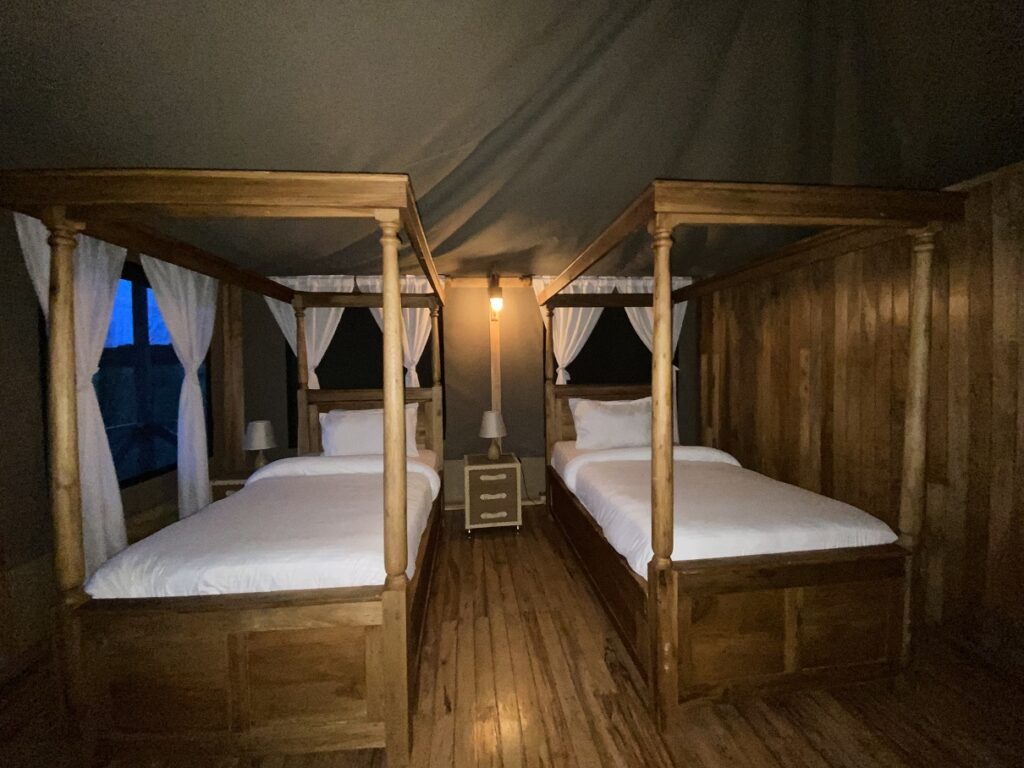
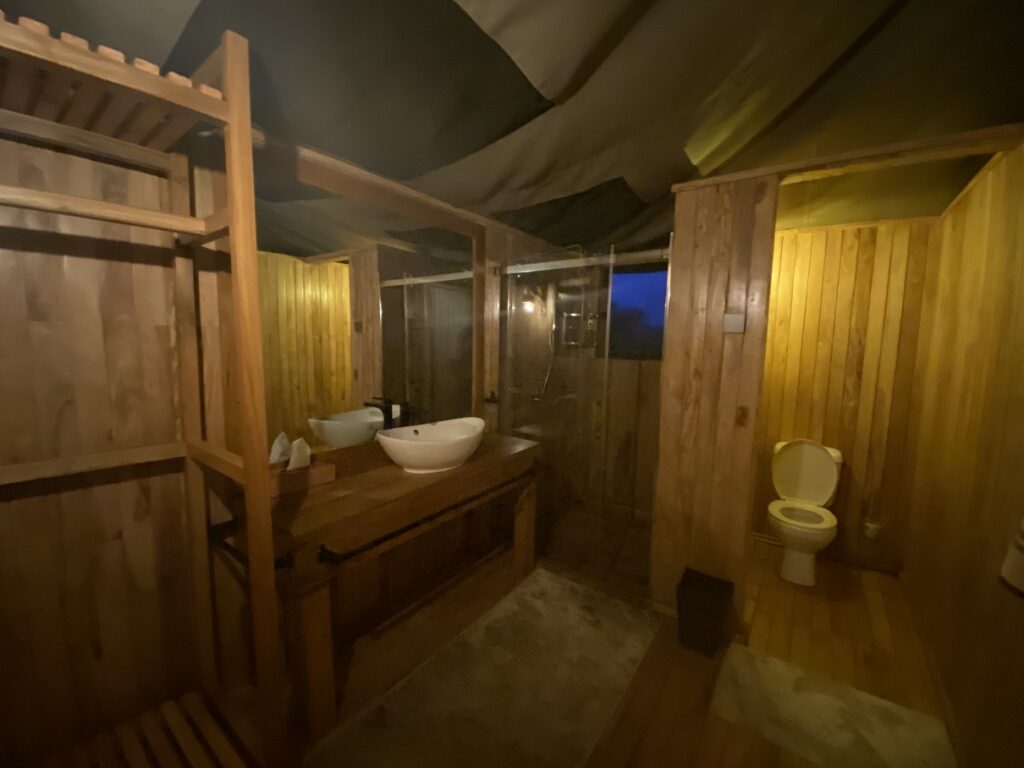
We had a family 2-bedroom tent. These are luxurious tents with amenities better than the Outpost Lodge we stayed in Arusha. In one bedroom, we had a king-size bed; in another, there were two single beds. Both rooms had ensuite bathrooms, and there was a living room between the two bedrooms. The fanciest “tent” camping I have ever done.
For dinner, we had some vegetarian options – rice and eggplant curry. The best part was the variety of fresh fruits. After dinner, we were escorted back to our tent and we hit the bed around 10 pm. I stayed up a bit late reading, hoping to hear some animals, but it was quiet.
Day 3 – Serengeti National Park
At dawn, it was not as quiet with the chirping of the birds, and Kasturi got up around 6 am. By the time I joined her, the sun was already out, and it was good to sit at the back of our tent and listen to the sound of nature.
When we met Benno for breakfast, he asked if we heard the lions past midnight and before dawn. Our first sighting of the day would be this pride of lions, a short drive from our campsite.
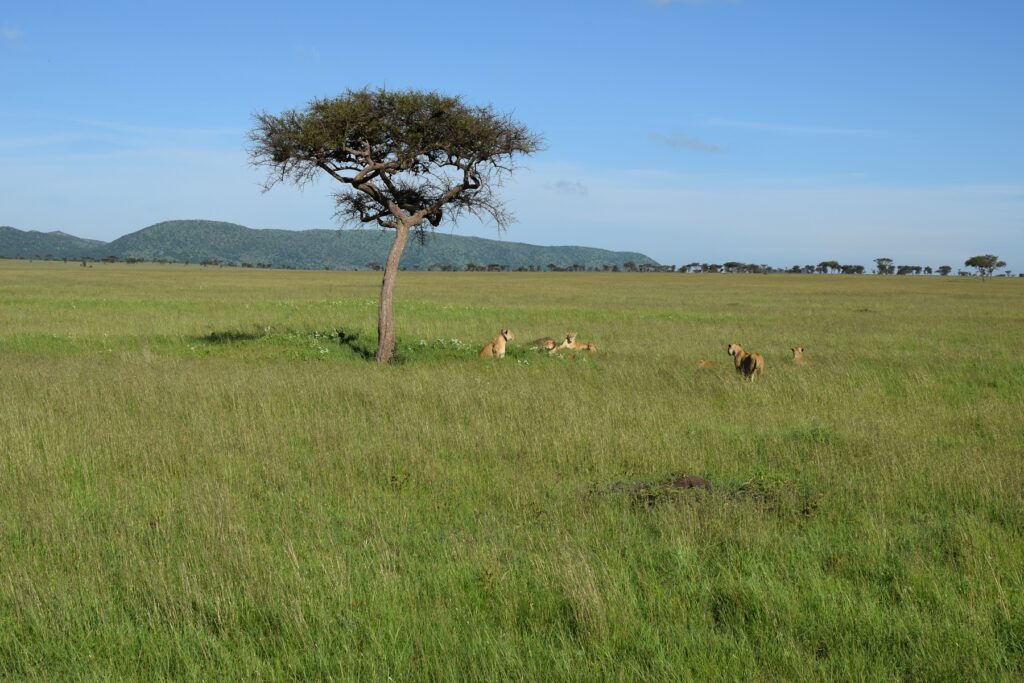
It was the biggest group we had seen in the last few days, with several cubs. Serengeti has about 3000 lions and 300 prides spread across 14,750 square kilometres.
We continued our drive and saw a big herd of elephants in the distance. Benno said that this group might be closer to the road later in the day, and we might have a better chance of seeing them close.
Impalas
Today was the day of the impalas, and we frequently saw a herd of impalas. One herd had just males; the other herds had one male, females and a few little ones.
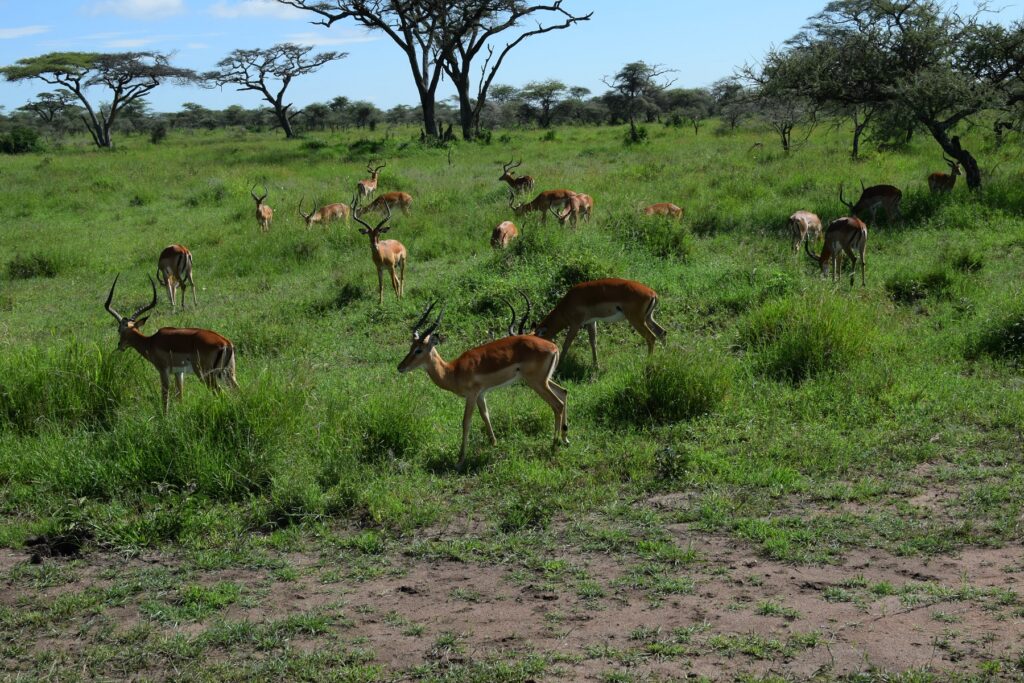
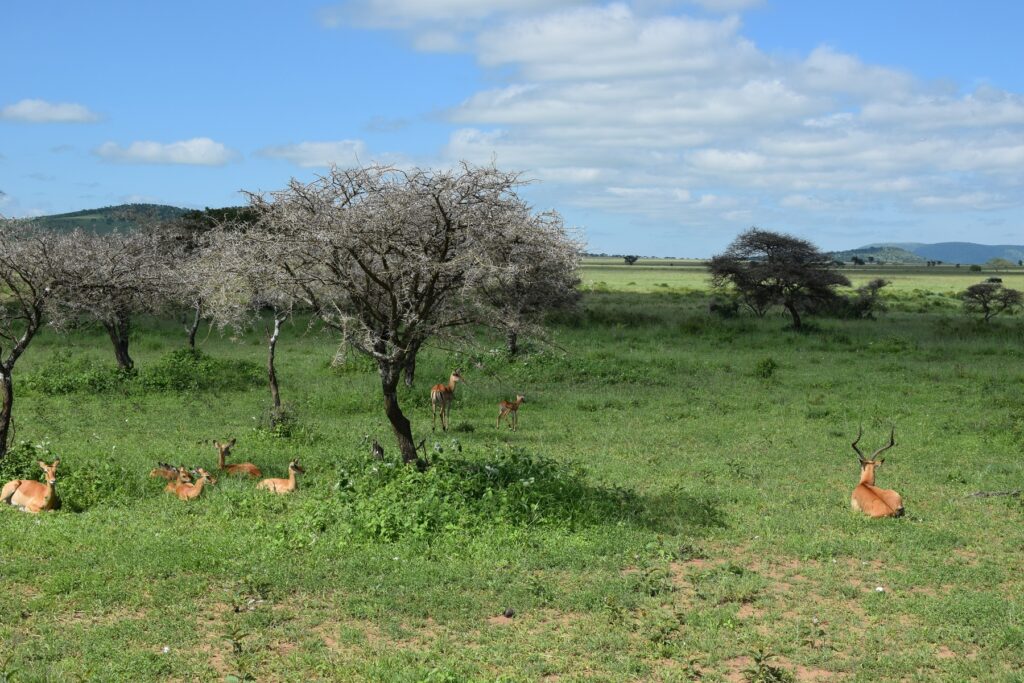
We also saw a couple of dik-diks, one of the smallest antelopes in Africa.
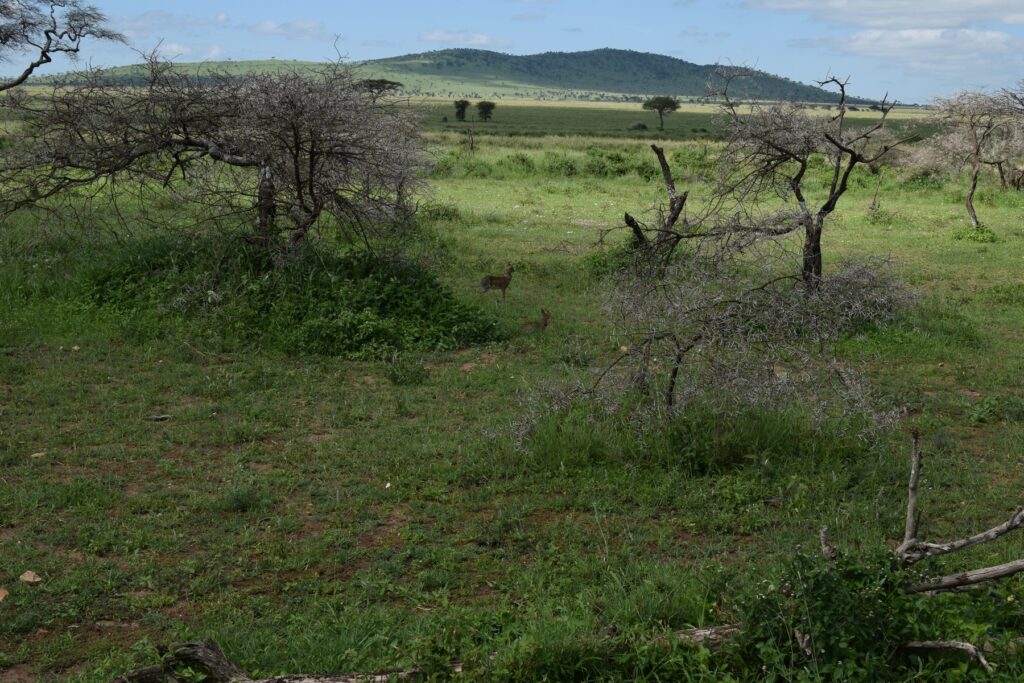
Hippos
Later, we stopped by a pool with many more hippos than we saw yesterday. These beasts can weigh up to three tonnes and spend most of the time in the water, usually coming out at night for grazing.
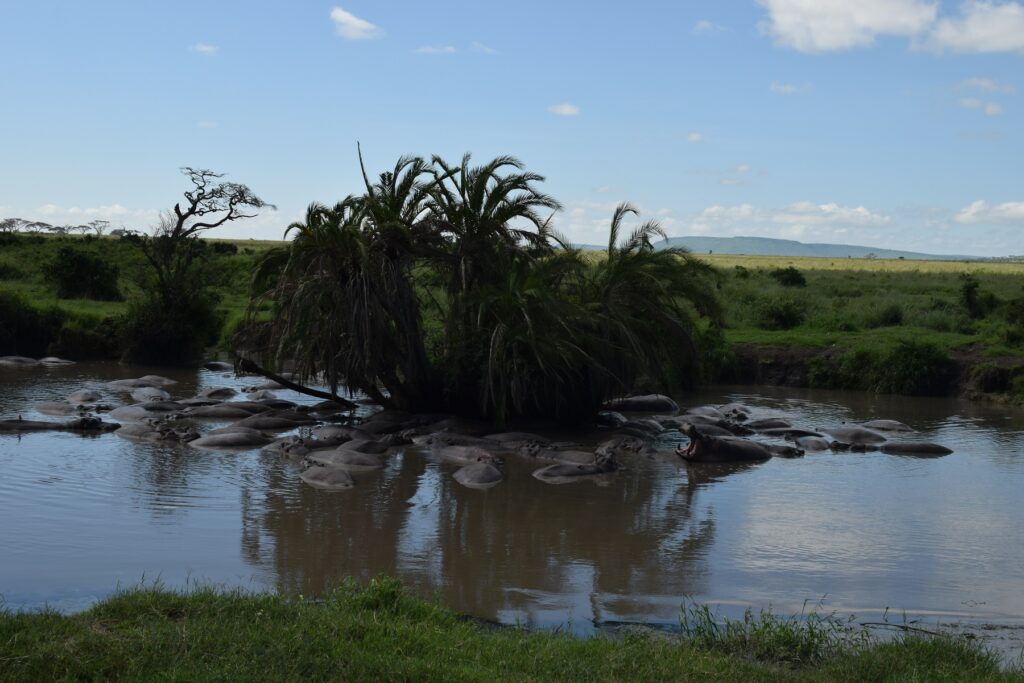
Later in the day, Kavya spotted a few hippos outside sunbathing and it was the only time we saw the hippos outside the water. Around noon, we took a lunch break, and another bloat of hippos was nearby. Their grunts and “wheeze honks” were quite loud and after lunch we walked to the pool to look.
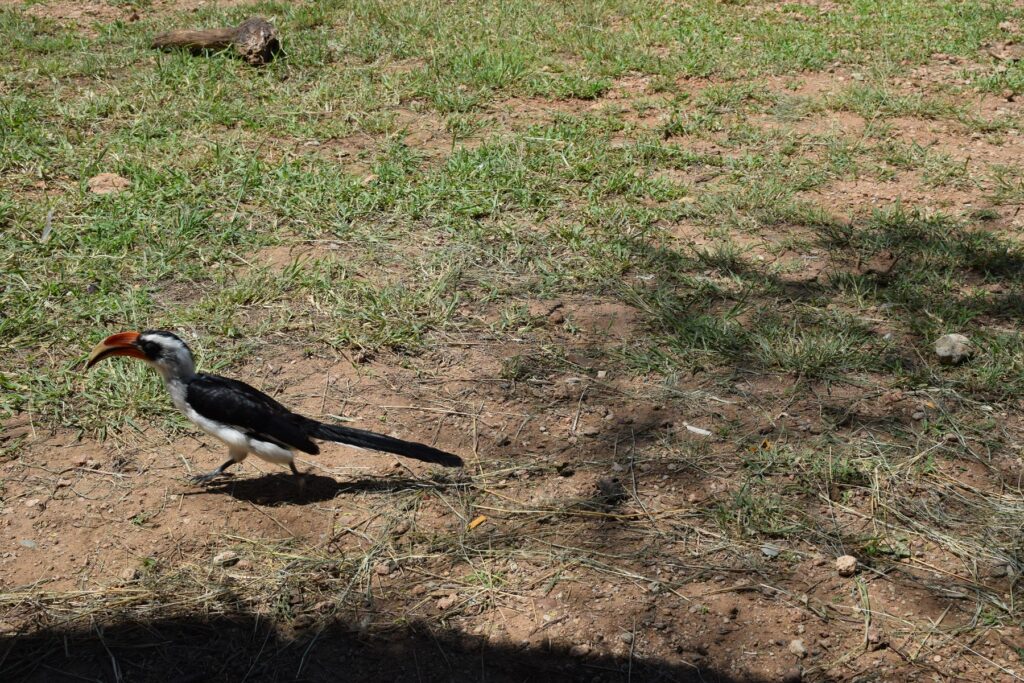
A few other animals we saw in the morning were warthogs, baboons and one crocodile. A hornbill walked around the lunch area, looking for scraps.
Giraffe
After lunch, we drove around for almost 40 minutes without any sightings. Kavya was tired and took a nap at the back of the vehicle. There was a dazzle of zebras, but Kavya had seen enough of them and didn’t bother to get up.
Finally, we woke her up when we saw a giraffe close to the road. As we drove closer, we saw a baby giraffe to the left that was sitting. The warthogs nearby were not too happy with the sitting giraffe; with their aggression, they finally made the baby giraffe stand up.
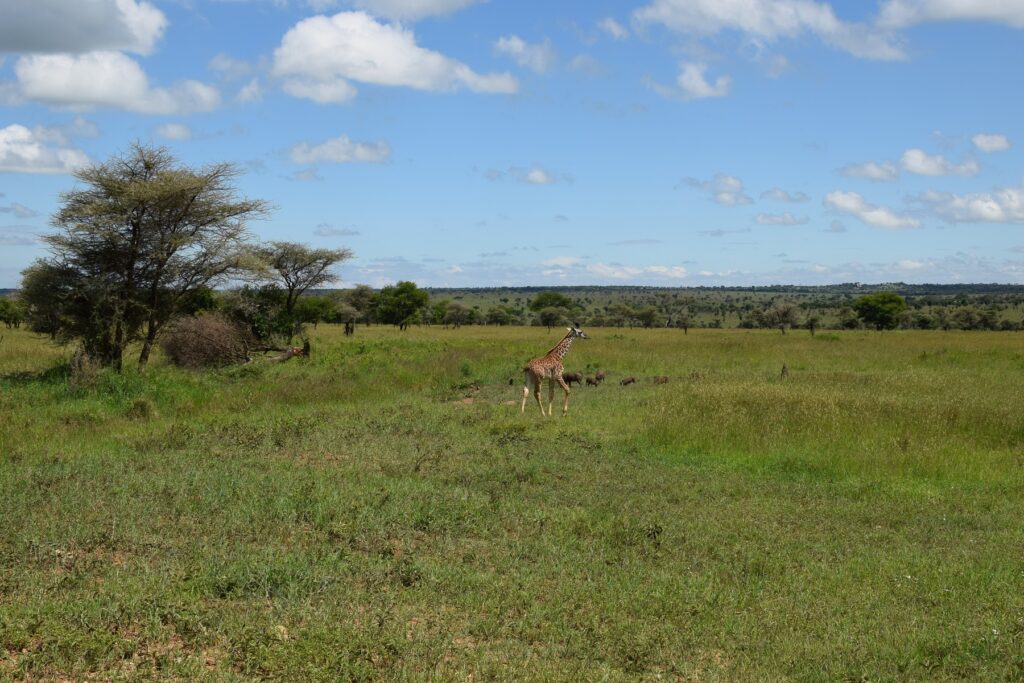
The giraffe went off the road, grazed for a while and then was back on the road. At one point, it was towering over our vehicle, and it was so close that I couldn’t even capture its legs in the frame (see the first picture in this post).
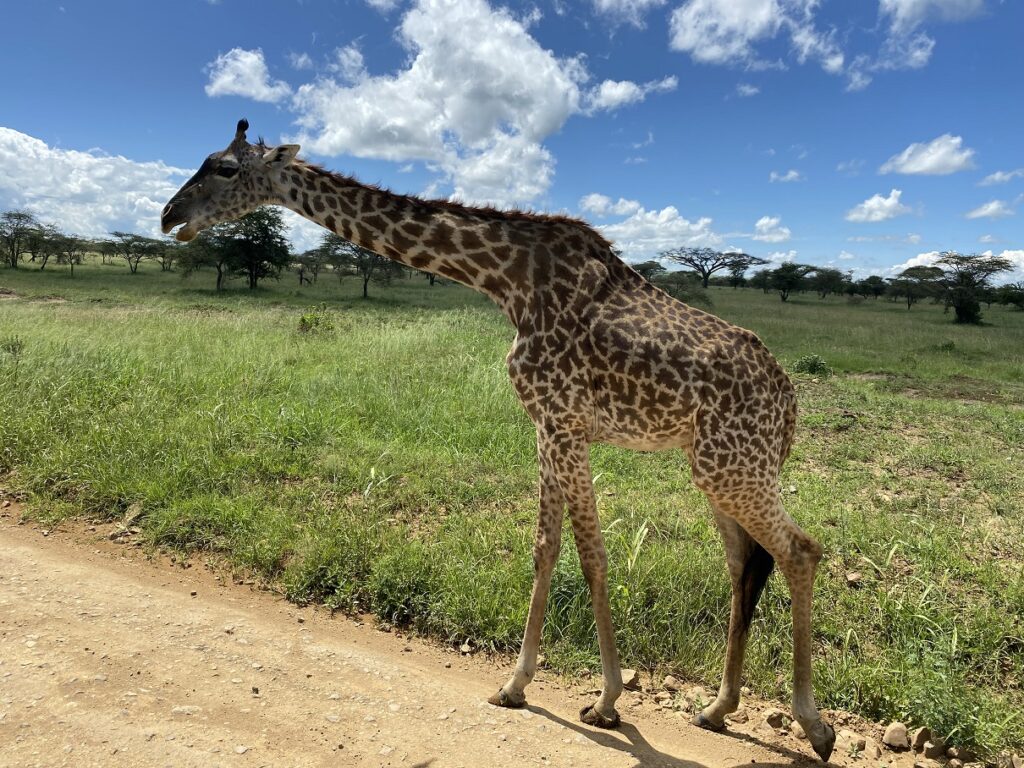
Cheetah
After another hour of driving around, seeing gazelles, topis, hippos, and warthogs, Benno heard something on the radio. Benno got excited, we were excited, and the anticipation of something we had not seen before was building up. This time, it was a pair of cheetahs on a termite mound, and the visibility was much better than yesterday.
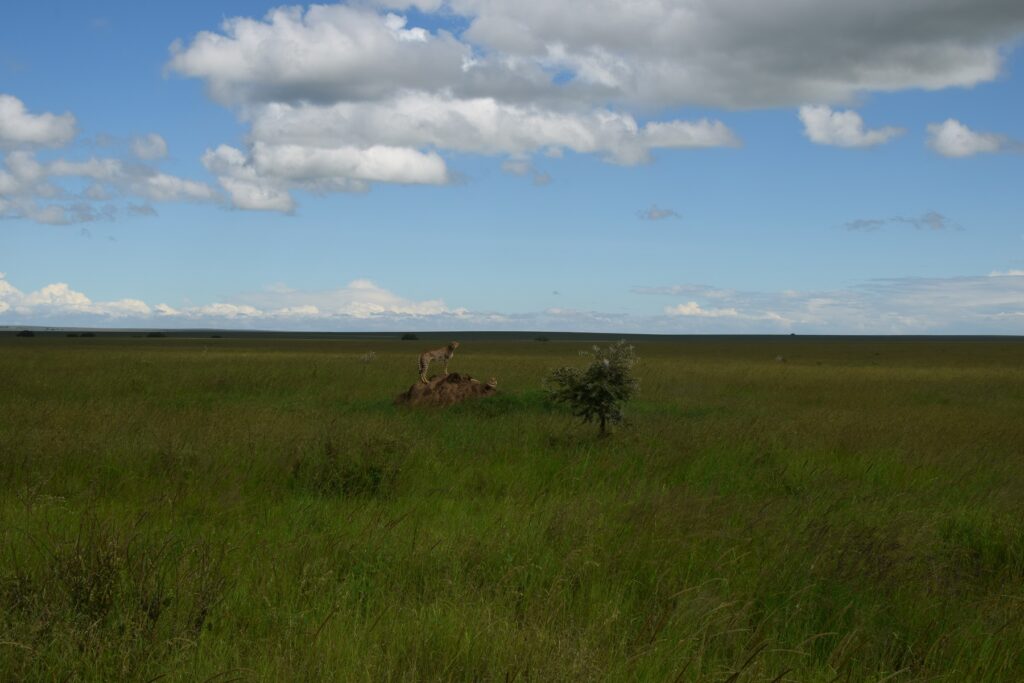
Here is the zoomed in version of the same photo –
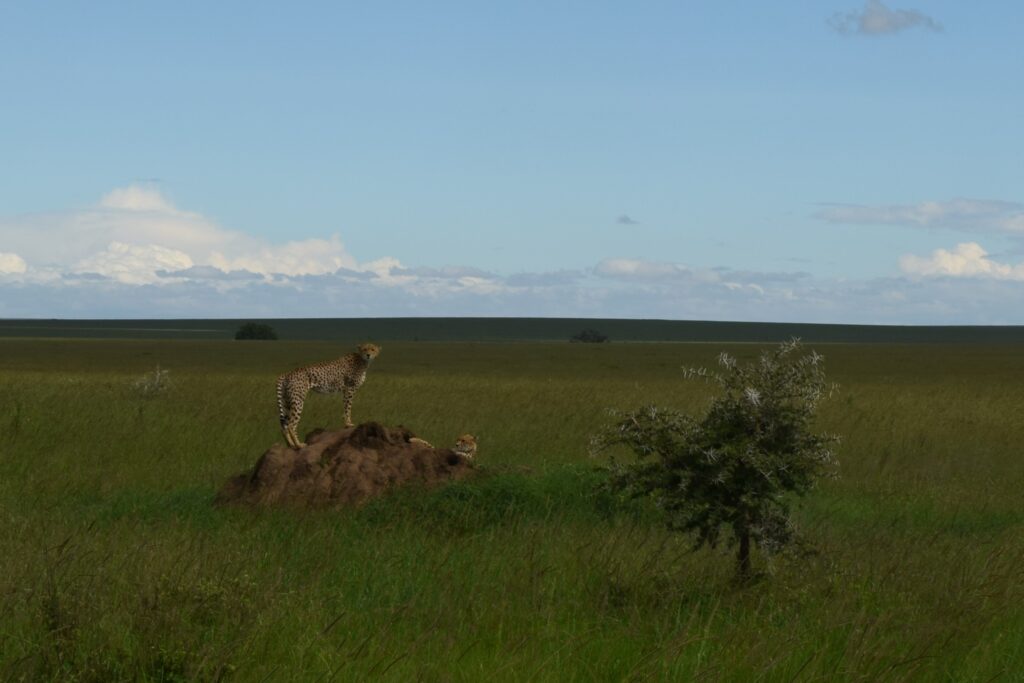
Over the next half an hour, we watched these graceful hunters. Later, the cheetahs came down from the mound, crossed the road behind us and climbed onto another mound.
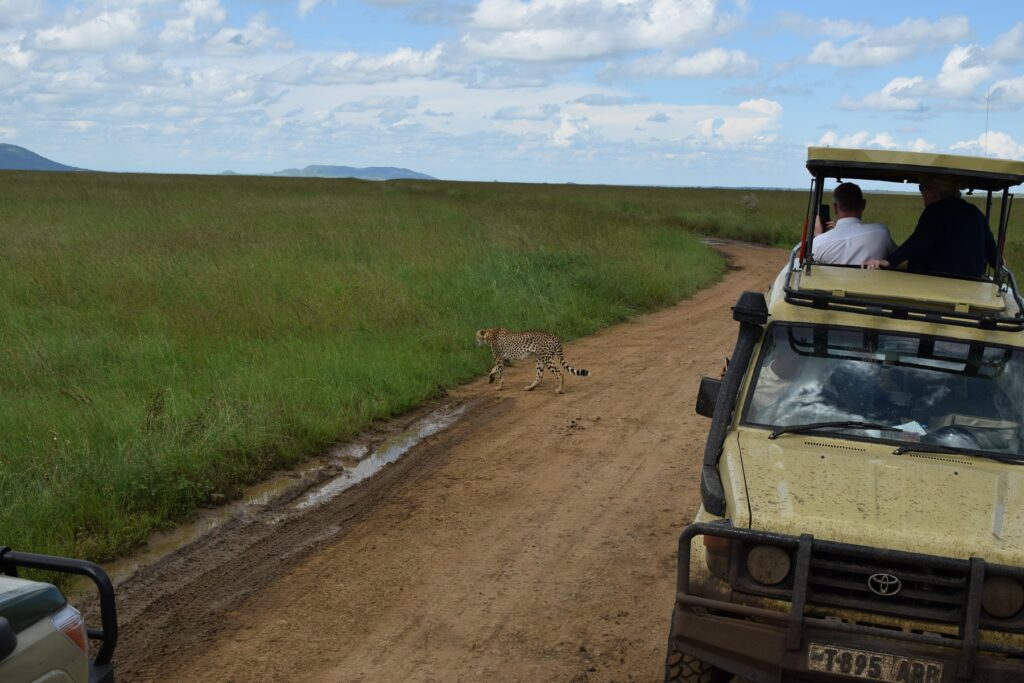
A Jeep from the Serengeti Cheetah Project followed the cheetahs. It is a great conservation initiative that helps protect more than 300 cheetahs in Serengeti.
Elephants
Now, it was late in the afternoon and time to see if the Elephants were any closer. Benno finally tracked down the elephants, but they were still quite far. We tried to get on a smaller unpaved road, but it was too muddy, so he backed off.
After driving around for a bit, he found another road that put us in a good spot to see the elephants. This was a much bigger herd with several baby elephants.
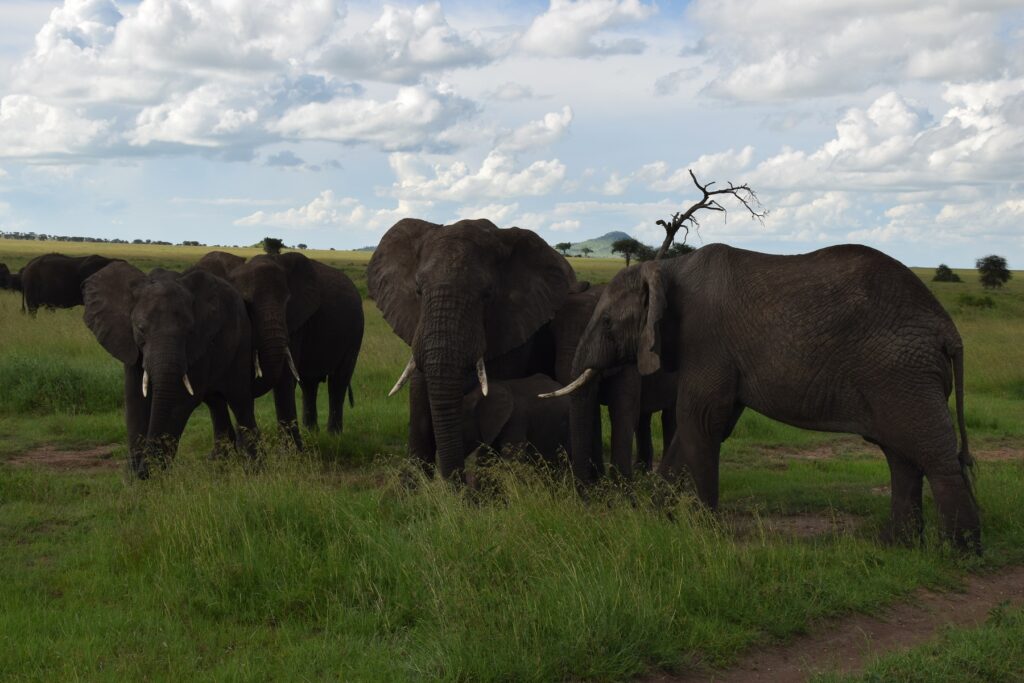
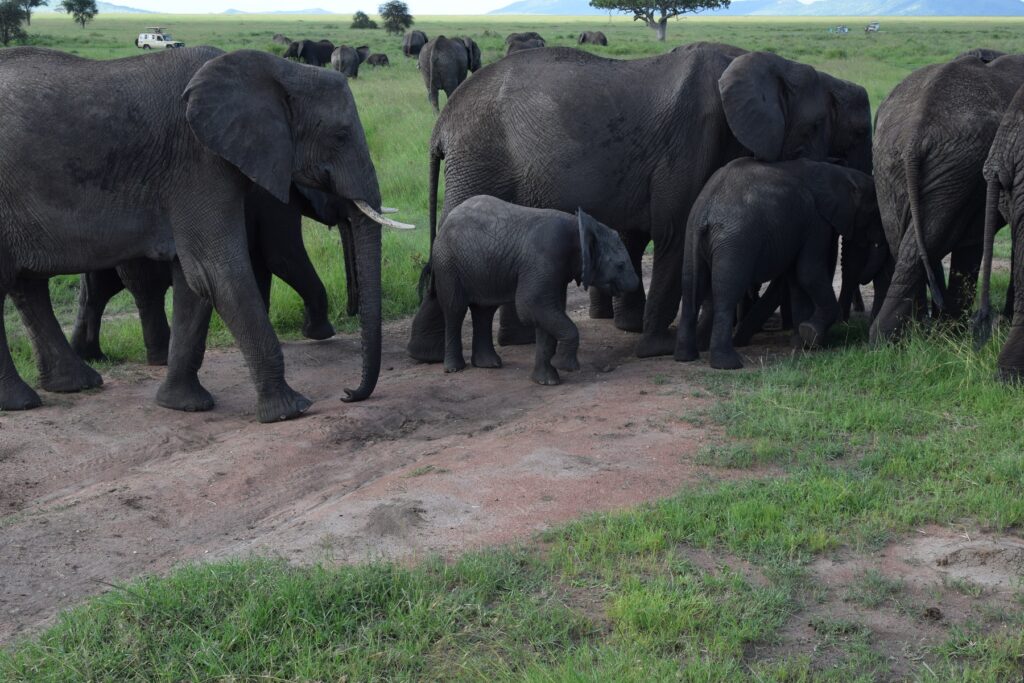
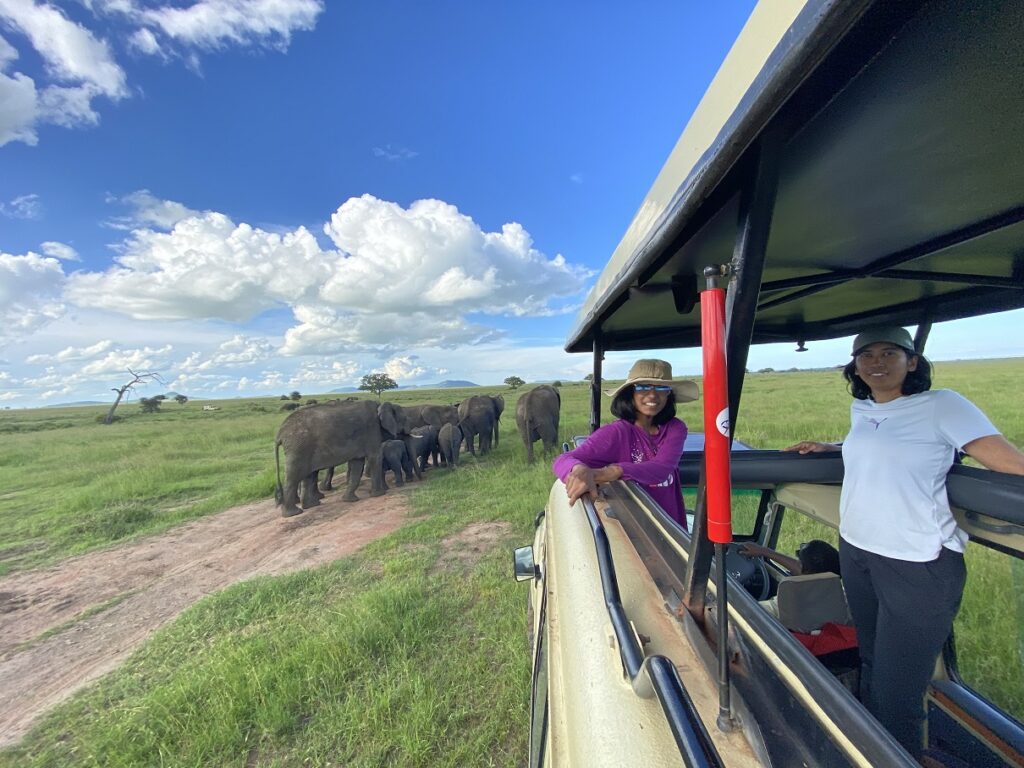
A few were digging up soil and appeared to be eating it. Benno explained that the elephants get the minerals from the soil to avoid diarrhea from eating all the grass.
Even among the elephants, the young males were the most mischievous and loud. One of them was running around, trumpeting and shaking his head. It was scary at times, but we trusted Benno.
Stuck Car
As we were getting ready to head back to the camp, Benno got a call on the radio. His friend’s safari vehicle was stuck in the mud. It was stuck in the same place Benno had decided not to go.
We first tried pulling the vehicle from the front, but there was little movement, and our tires spun. Then, we tried to push the car by placing a blanket on the grill guard. It helped, but not enough to get the car completely out.
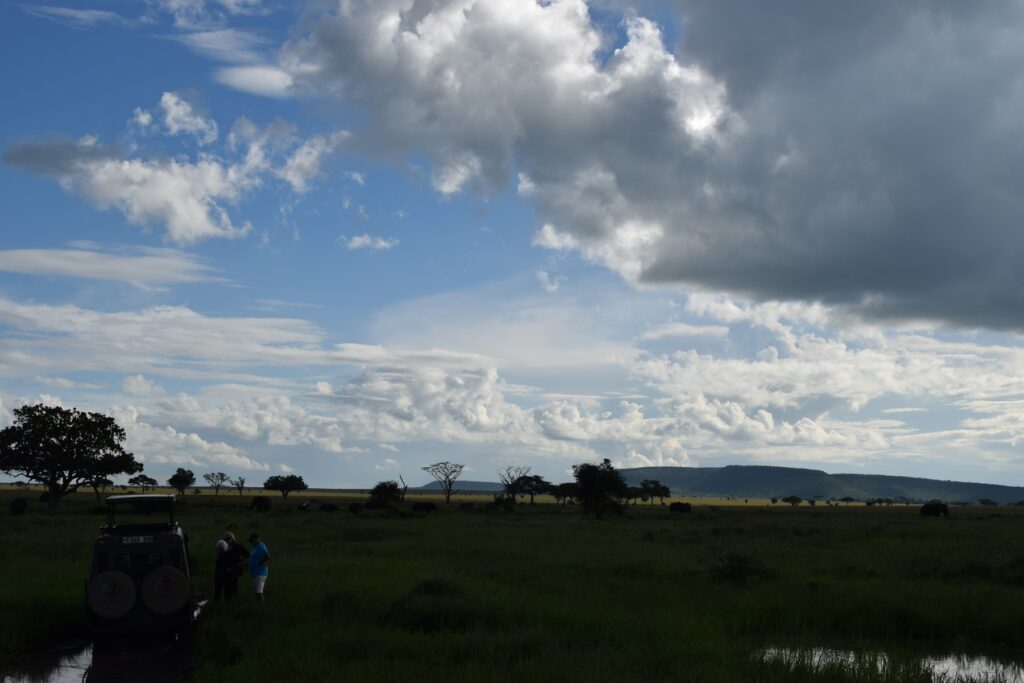
Finally, we approached it from the back and tried to pull the car. But in this process, we got our car stuck. Now, there were two cars stuck, and it was getting dark. The elephants around us were not bothered by the situation, but it was not a good place to be.
After a few more calls on the radio, a safari guide came for help and got us out. By now, the rangers were aware that we had tried everything and couldn’t get the car out, so they were also on their way.
Hyenas
It was 6 pm by the time we got back to our camp. We spent some time outside the dining area and then had a good dinner with Benno.
After dinner, one of the staff members came with us to escort us back to the tent. As we approached our tent, we saw something move right next to our tent. When we shined the flashlight in the area, we saw a hyena, and it ran into the bush. Then, there was another one near the tent that followed suit. The staff was not kidding when they said yesterday that hyenas sometimes take away shoes if left outside the tent.
Day 4 – Serengeti National Park and drive to Rhino Lodge
I again slept through the night and didn’t hear anything, while Kasturi and Benno shared stories of hearing the lions at night. It was our final day in the Serengeti, and as per the permit, we were supposed to cross the Naabi Hill checkpoint by 1 pm.
Leopard
It was a very unusual morning as there was no sighting and no chatter on the radio either. Finally, after almost an hour and a half of driving, the radio lit up. Benno asked us to roll up the windows as we drove through muddy sections. At one point, I thought we were stuck again, but luckily we were not.
By the time we arrived at the spot, about 4-5 vehicles were lined up. We had gotten lucky again, this time with a leopard. Initially, it looked like the leopard was tracking down something, but later it changed direction and crossed the road right in front of our vehicle.
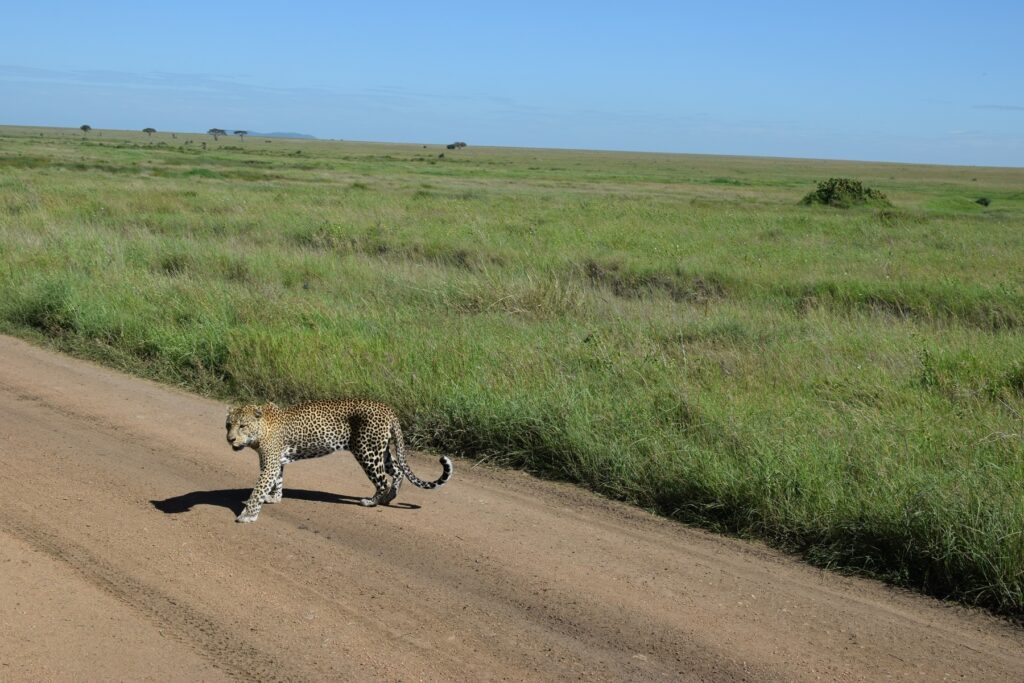
Given the low/no sighting elsewhere, many more vehicles were making their way to see the leopard. At one point, I counted about 30 vehicles. Some guides/clients were too aggressive and tried to get as close to the leopard as possible instead of just turning off the car and staying put.
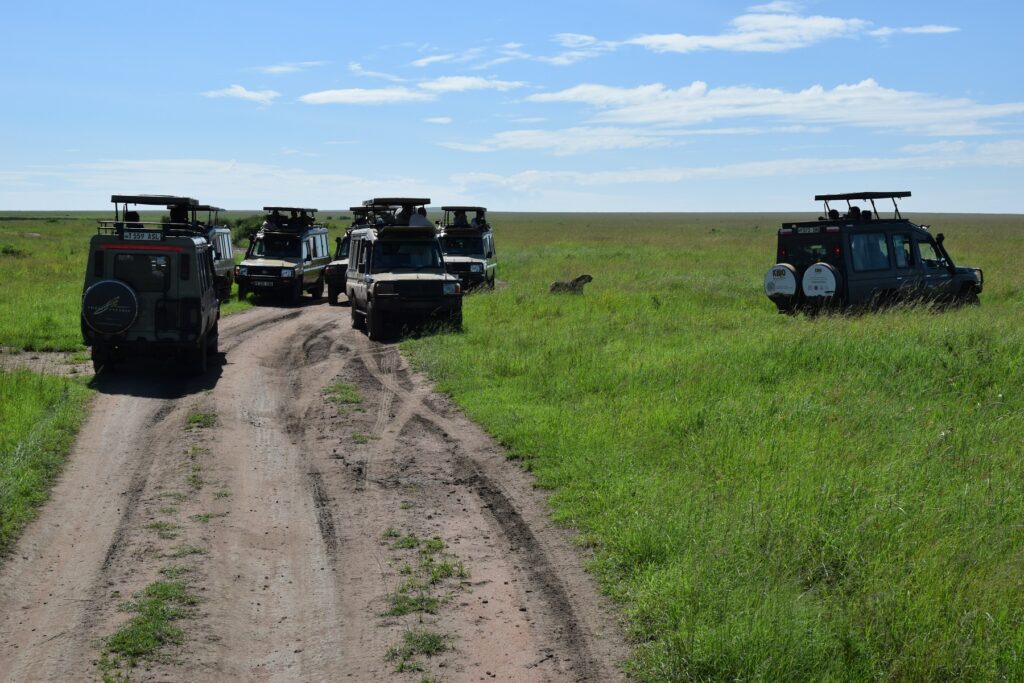
Benno said that this was still not bad as it was the low season. In the peak (dry) season, hundreds of cars are lined up, sometimes waiting a long time before they even get to see the animal.
Mongoose
Later in the morning, we saw a pack of mongoose. I had seen mongooses in India before, but I remember them being very small and had never seen them in such numbers.
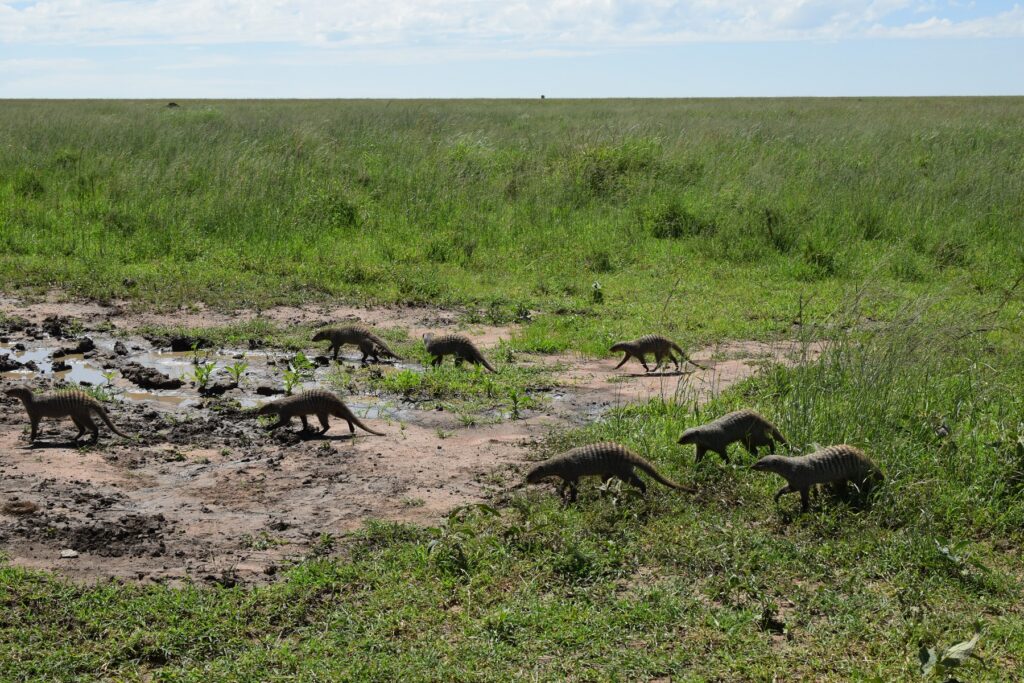
After a quick stop at the rest area, we started driving out of the park to Rhino Lodge in Ngorongoro Conservation Area. On our way out, we saw another herd of elephants. We waited a while, hoping they would cross the road, but they had different plans.
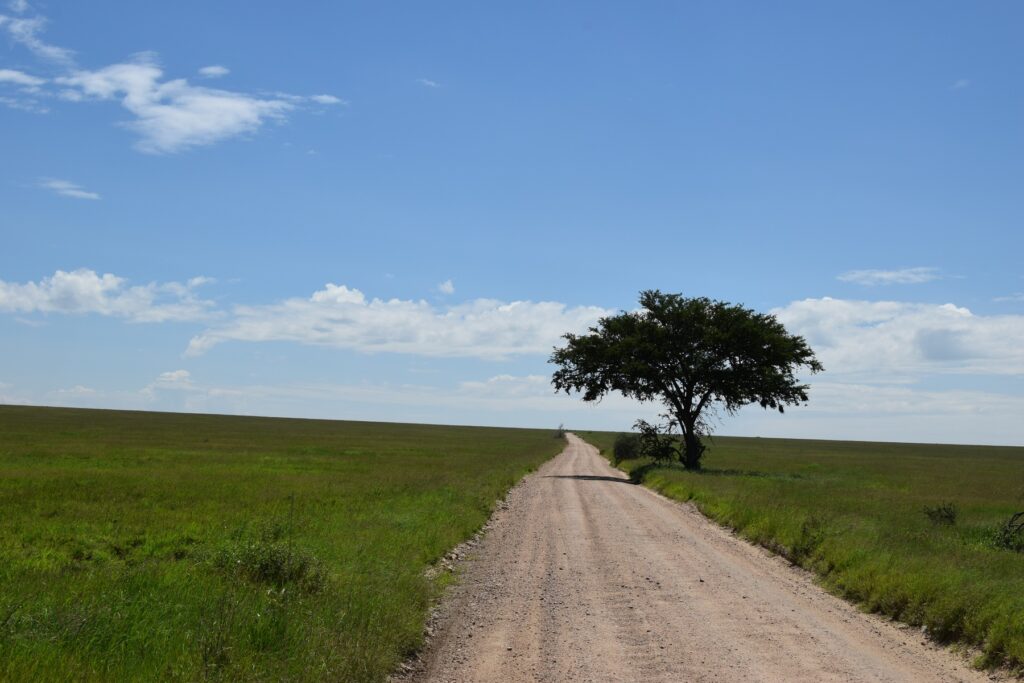
Further ahead, a pair of eagles on an acacia tree terrified small birds as the eagles looked to prey on the young ones. A few moments later, we saw some vultures.
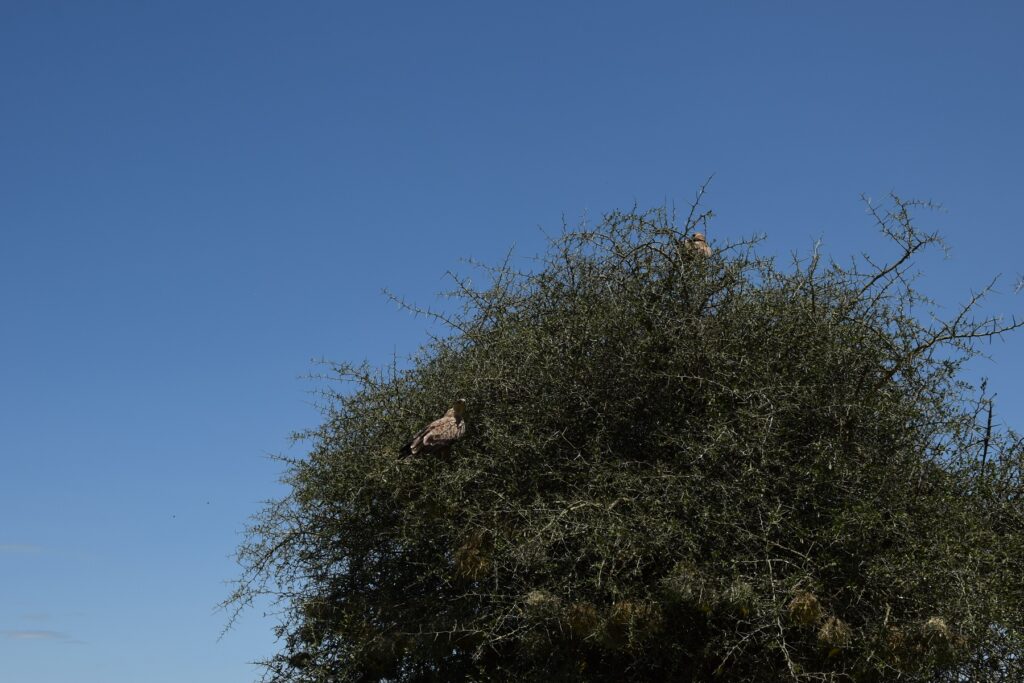
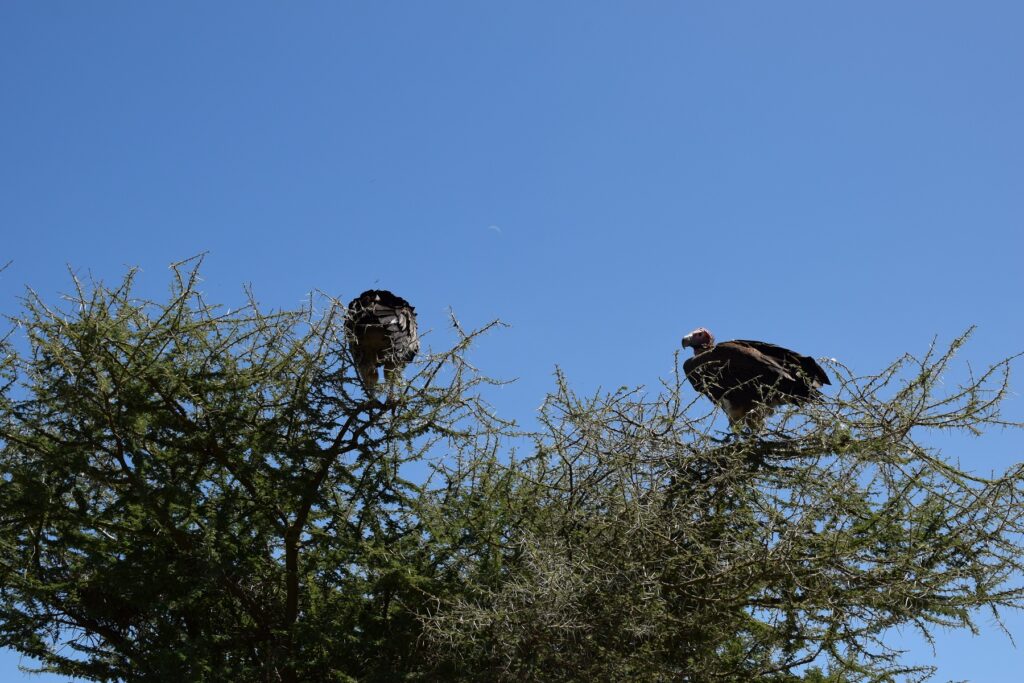
We took our lunch break at Naabi Hill and continued driving to Rhino Lodge. We had the hood down as it would help speed up the drive. As we left Serengeti, we saw some lions next to a wildebeest carcass. It was fresh and was probably from their hunt earlier in the morning.
We continued to see more of the usual suspects – the gazelles, wildebeests and zebras.
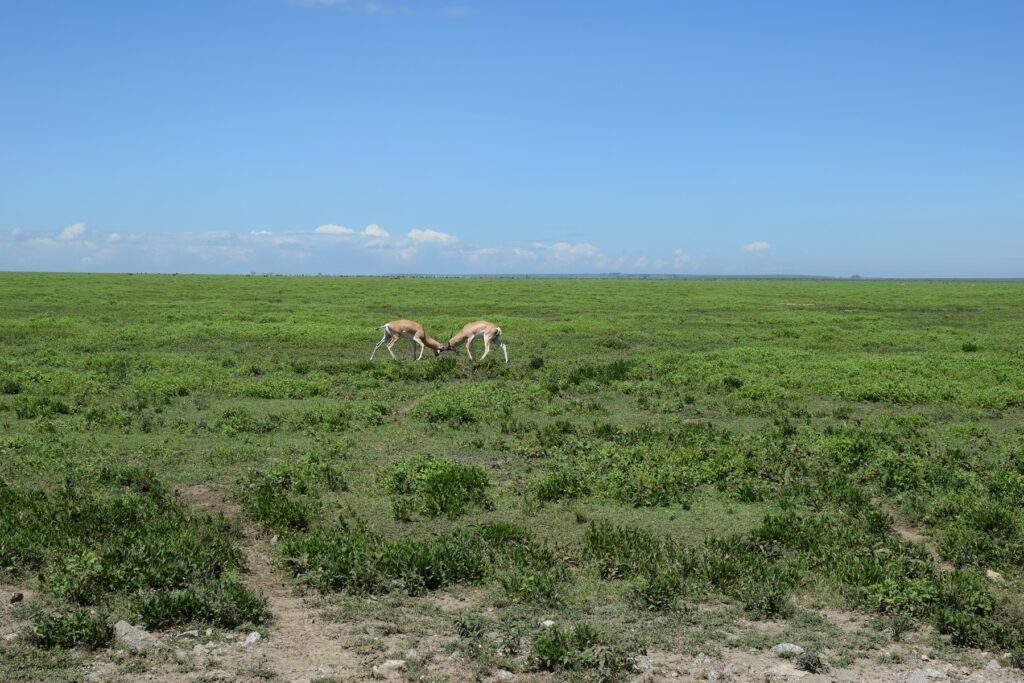
And yes, there was this hyena too, that was looking for a weak one among the wildebeests. The gazelles were not bothered by the hyena.
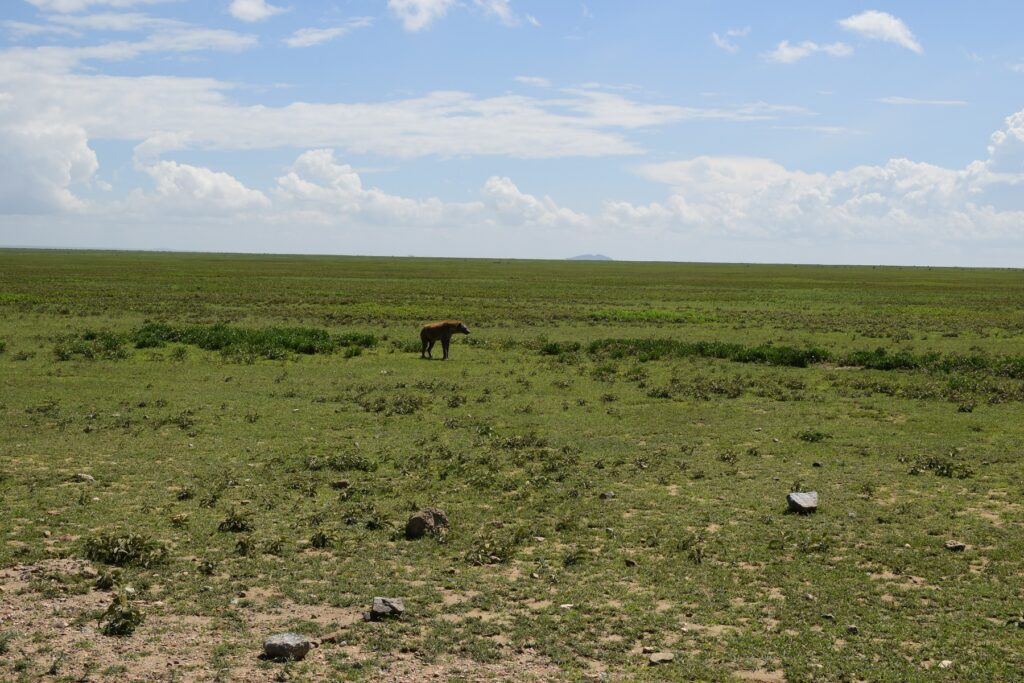
Rhino Lodge
Around 2:30 pm, we entered Ngorongoro Conservation Area. We slept well in the car for the next few hours of our drive. Around 4:30 pm we arrived at the Rhino Lodge – one of the oldest and rustic lodges in the area.
They had a small information centre about Masai people and their culture next to the reception, which was good. The grounds were clean and well-maintained. Our room was relatively small and had a small balcony.
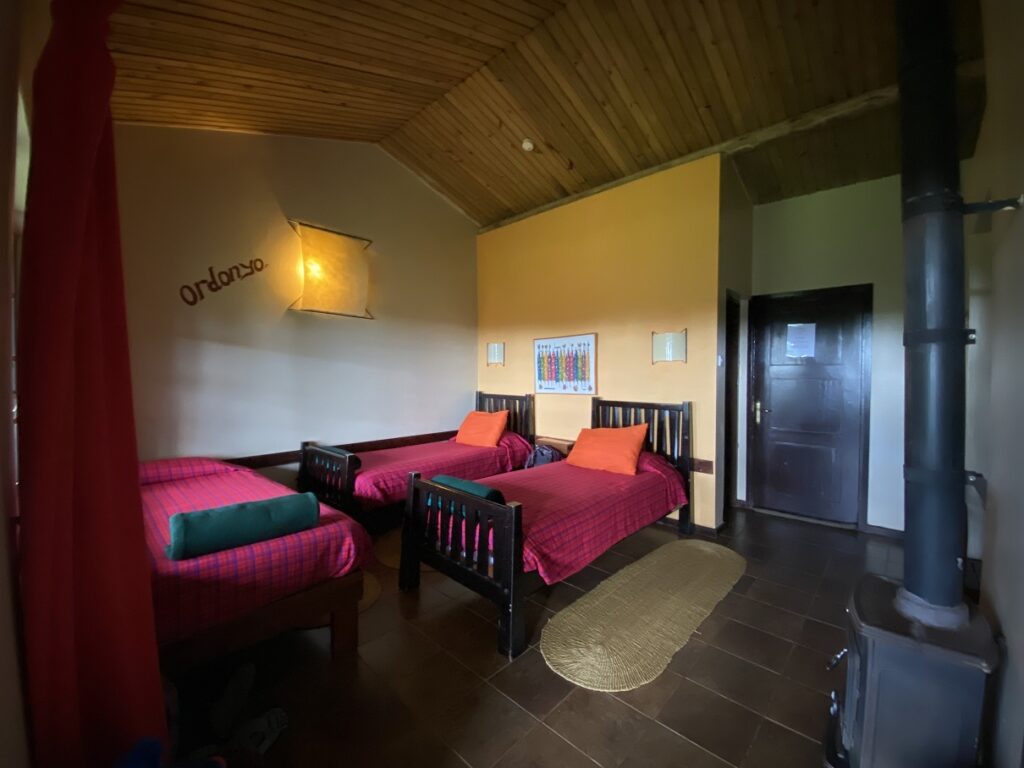
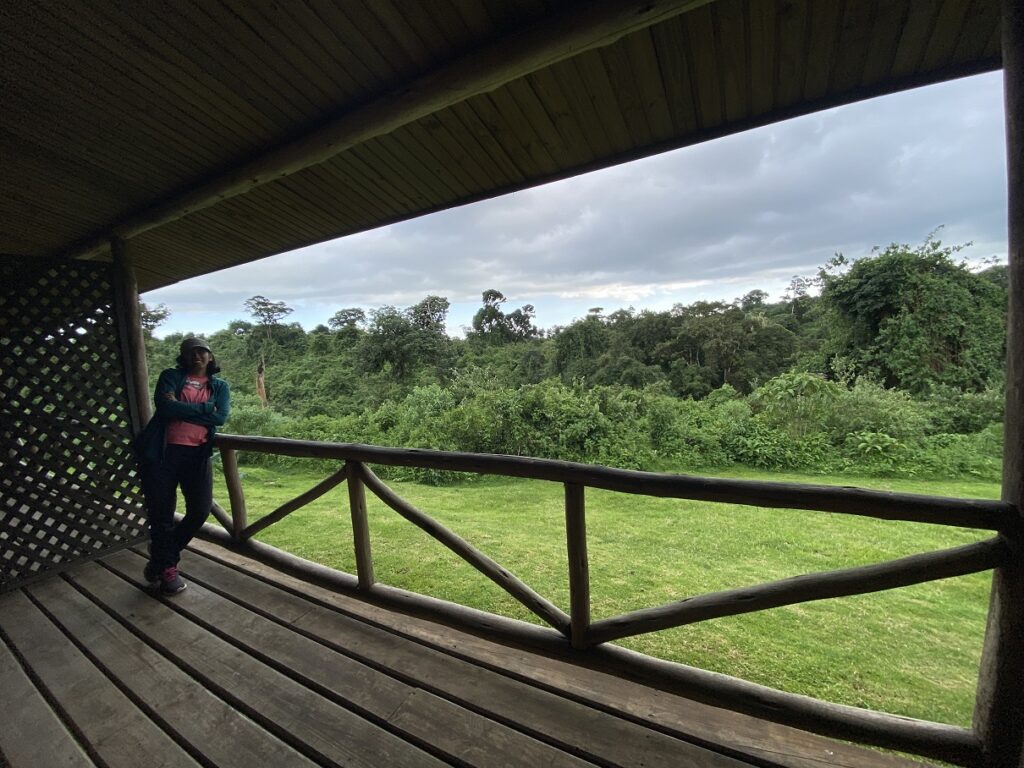
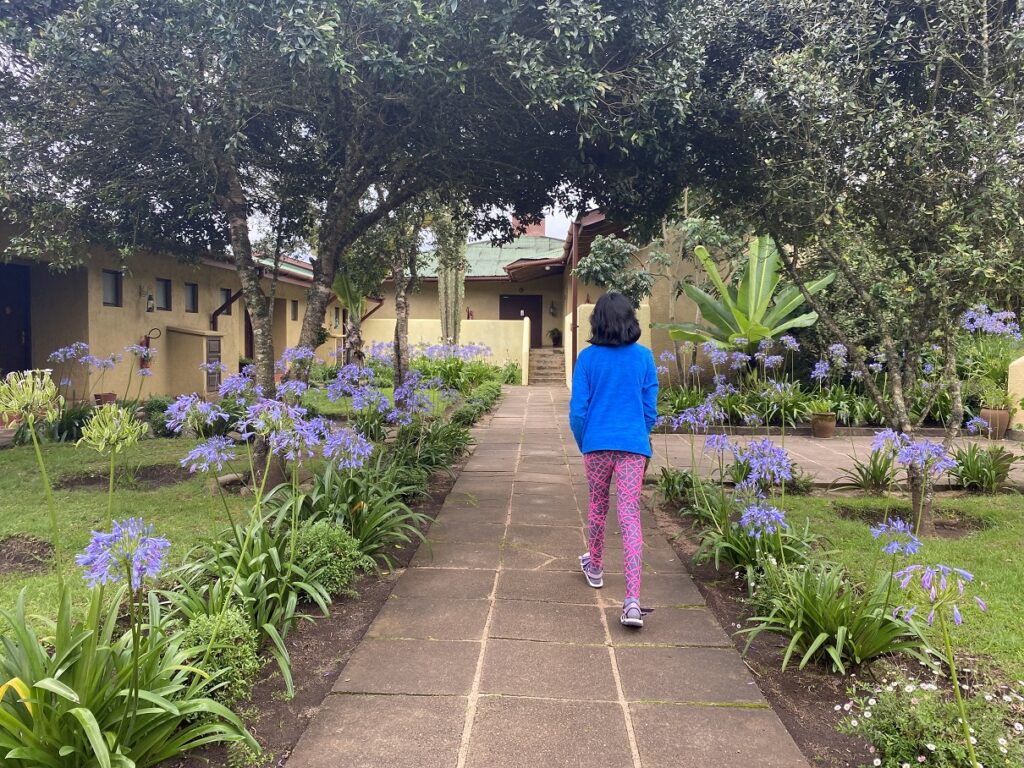
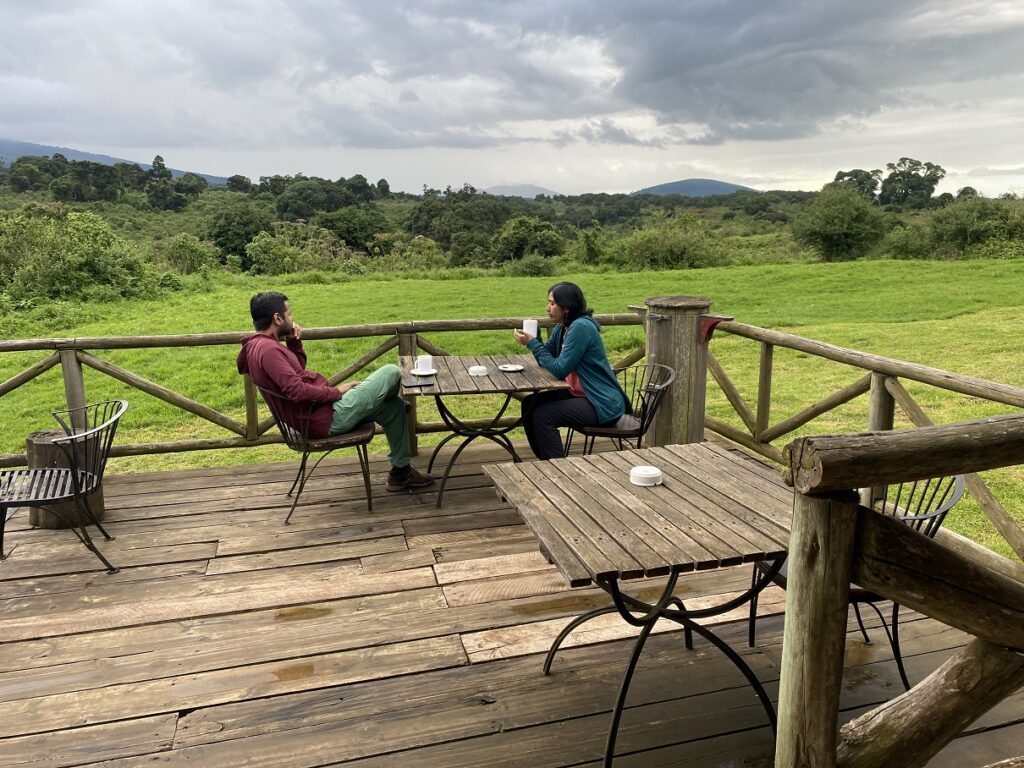
The dining area and especially the patio was very good. It had a fireplace and a great view of the surroundings. A couple of waterbucks were on the grounds in the evening. Earlier, at the reception, I saw a picture of an elephant on the property. Later, Benno reported seeing a leopard at the gate.
The lodge is at 2200 m, so it was cooler than other locations. We had an early dinner and went to bed soon as we had an early start the next day.
Day 5 – Ngorongoro Crater
We woke up at 5 am and went to the dining area for breakfast. The breakfast is typically served at 6 am, so we had to request a 5:30 am breakfast.
We were in the car by 6 am and drove to the Ngorongoro Crater Seneto Gate. We missed the sunrise by a few minutes, but it was a beautiful view of the sun rising over the mountains with the fog covering the crater.
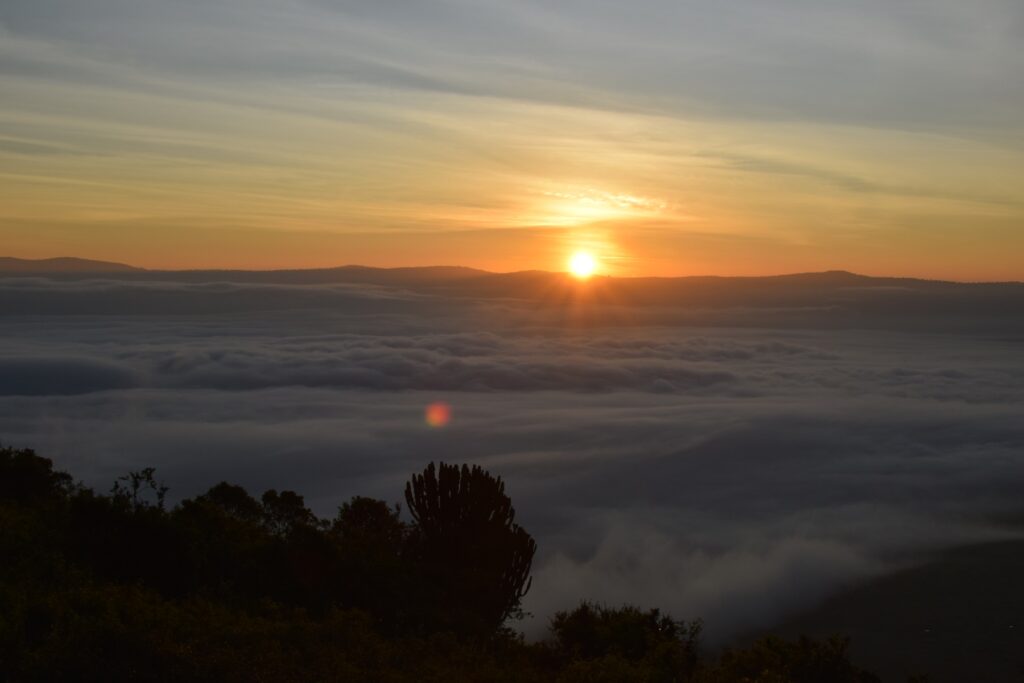
The crater is 610 m deep, covers about 260 square kilometres, and has different ecosystems (grassland, swamps, forest, etc.) with thousands of animals and hundreds of species. Our main goal for today was to see a Rhino.
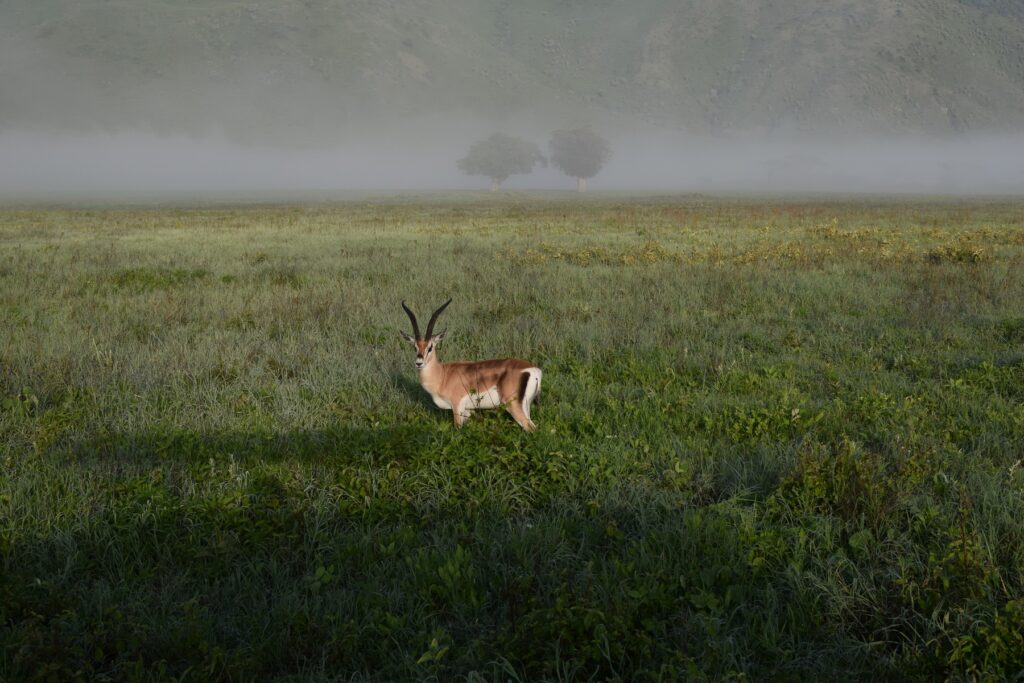
The fog was still there when we reached the bottom of the crater, so the visibility was limited. But we could still see some animals – buffaloes, wildebeests, gazelles, etc. We could hear the lions but didn’t see them.
Forest Area
Benno took us on the game road, going through the forest area in the crater. Soon, we saw two elephants. One was right on the road.
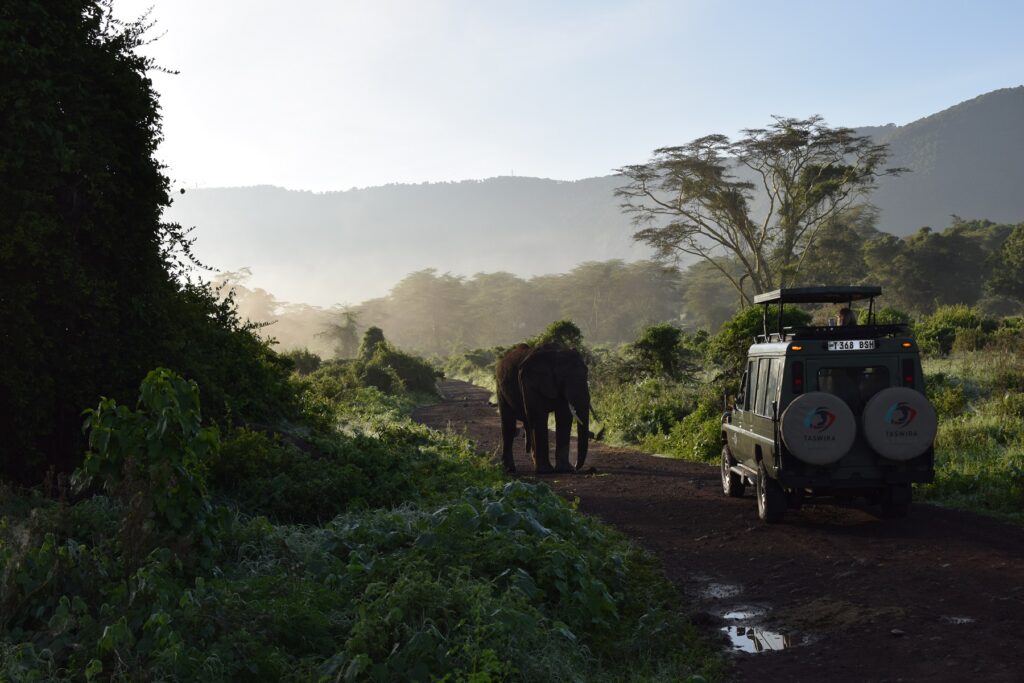
A few minutes later, it was a lioness. We stopped the car, and the lioness went into the bush for a short detour and was back on the road behind our vehicle.
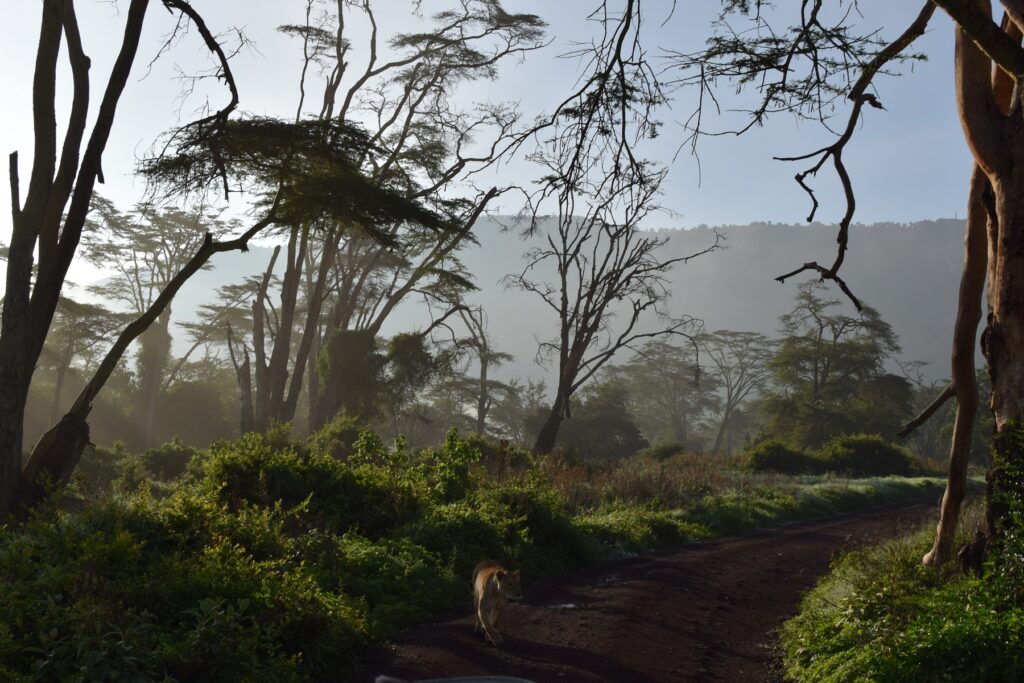
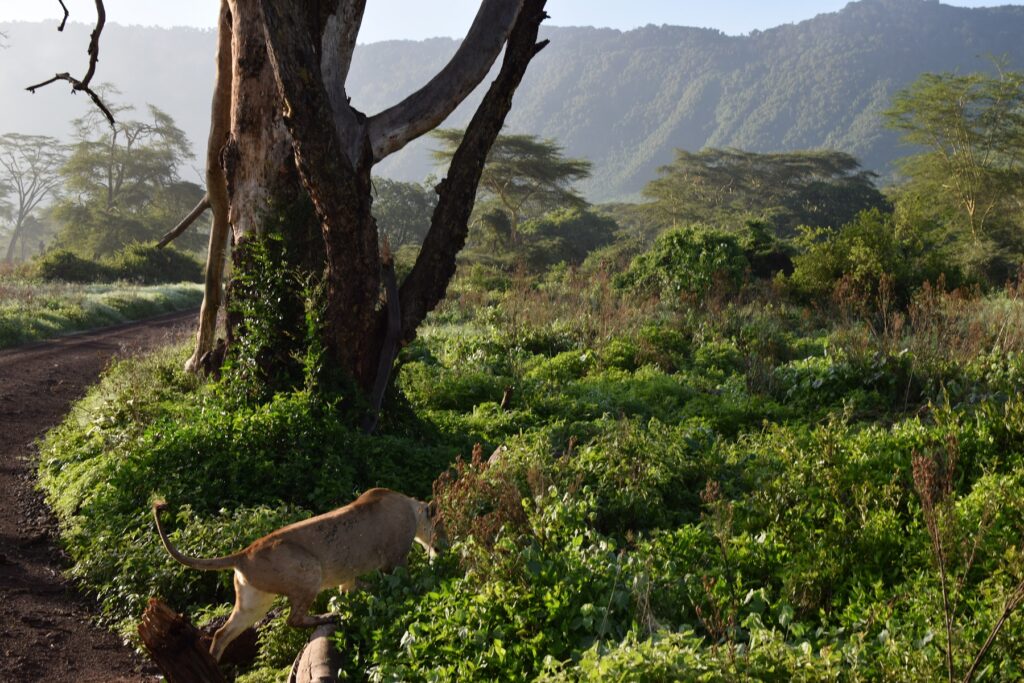
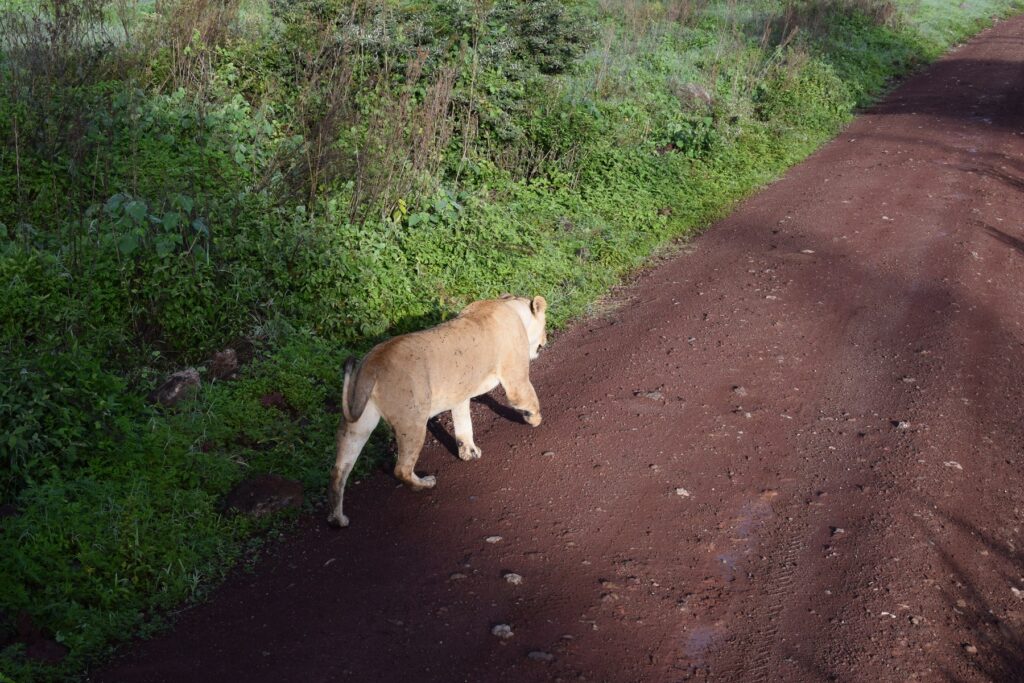
After a quick stop at the rest area, we drove out of the forest into the grassland area. The fog was still thick, but Benno somehow spotted three rhinos.
Grasslands
We saw only buffaloes and zebras, but Benno guided us in the right direction. With the binoculars, we could see the rhinos in the fog. We continued to drive, hoping to get a better sighting of the rhino. We saw some more buffaloes, cranes and then another huge elephant.
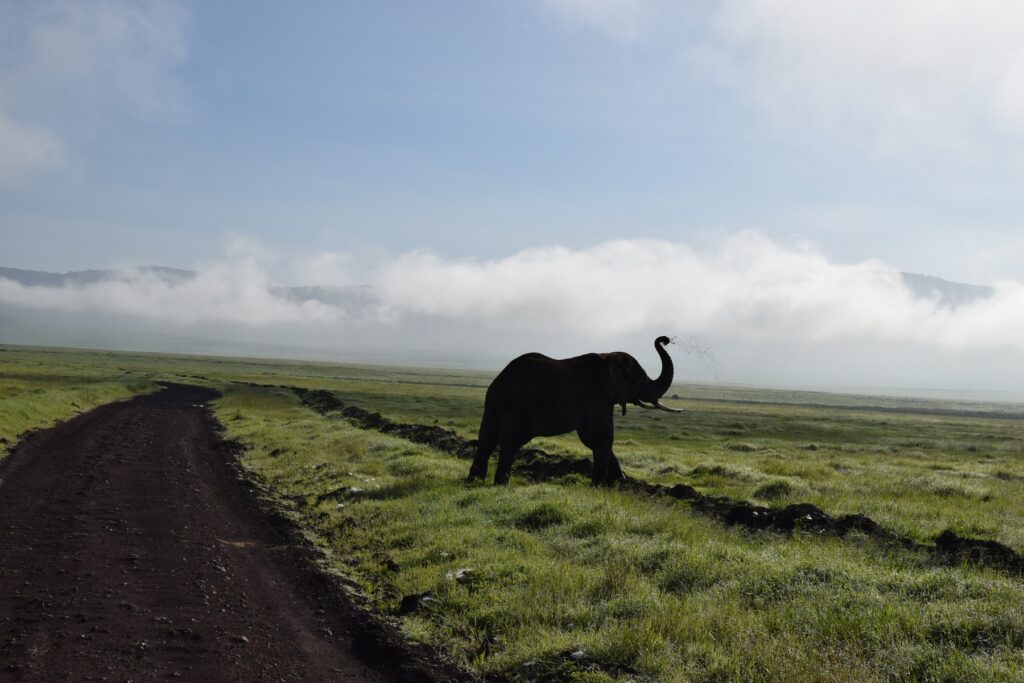
Further ahead, we saw an ostrich. We had seen a few in Tarangire, but never this close.
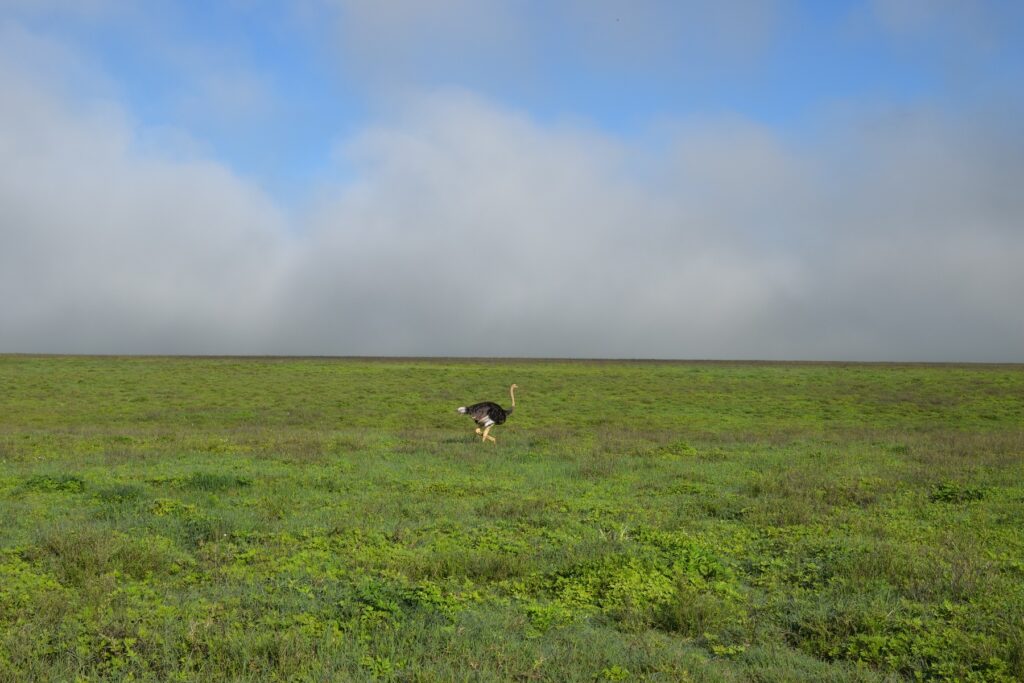
The zebras in the crater were less skittish than those in Serengeti. Even as the cars approached, they were happily grazing and not bothered. Which allowed us to take some close-up pictures, especially of a young one.
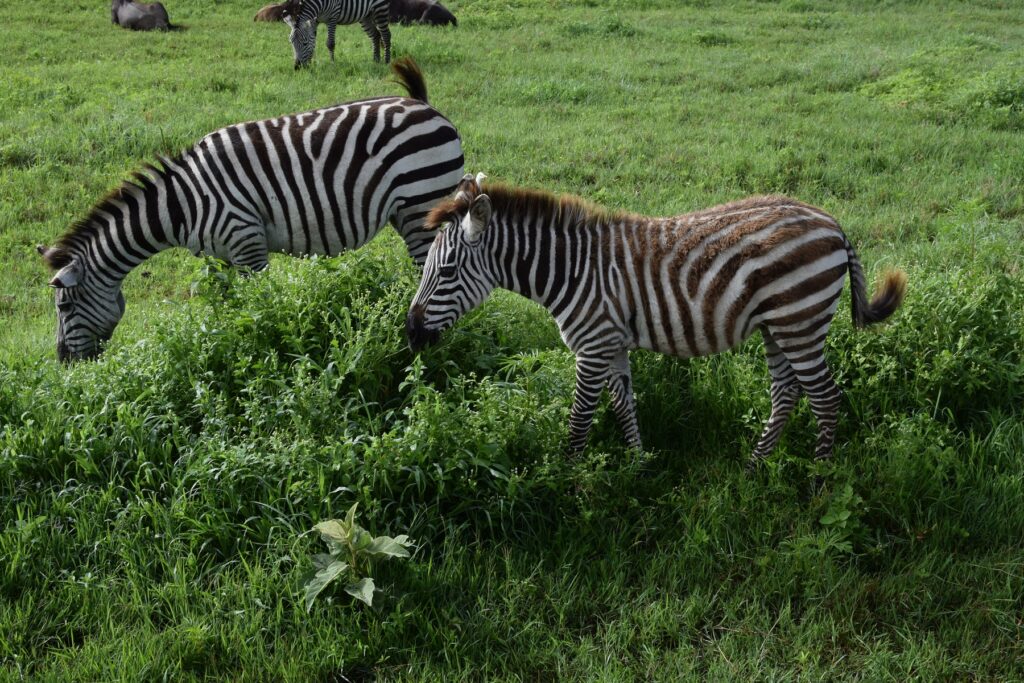
Swamps
As we drove past the swamps, there was a herd of elephants. The one close to the road was knee-deep in the swamp.
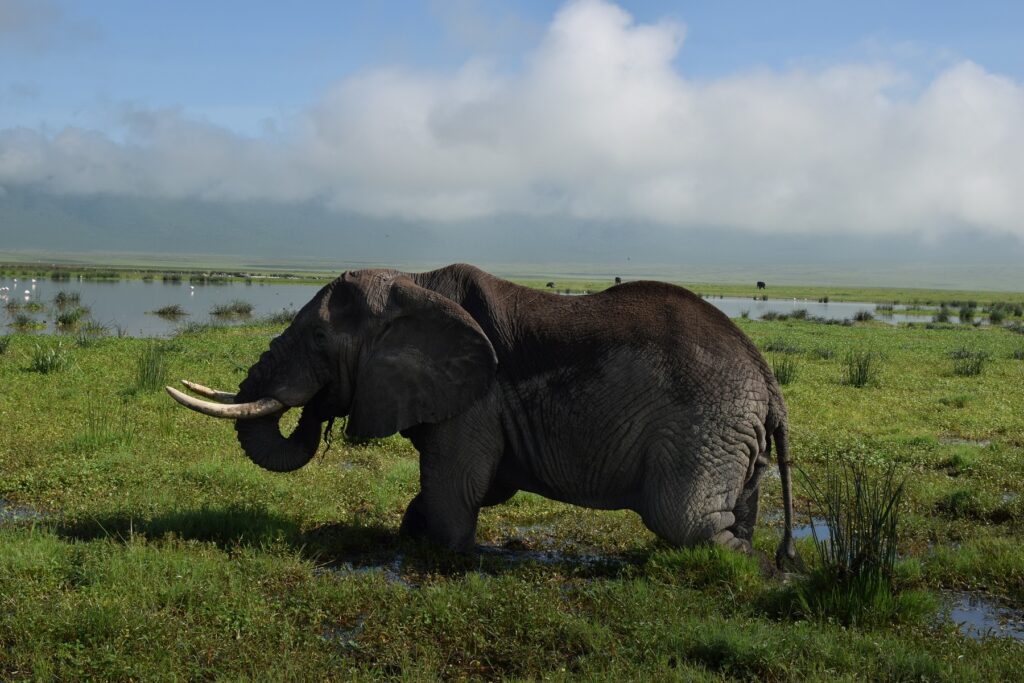
There was an impressive collection of birds near the swamp and lots of flamingos near the lake. There was a small one-way road to the lake, but we didn’t go there.
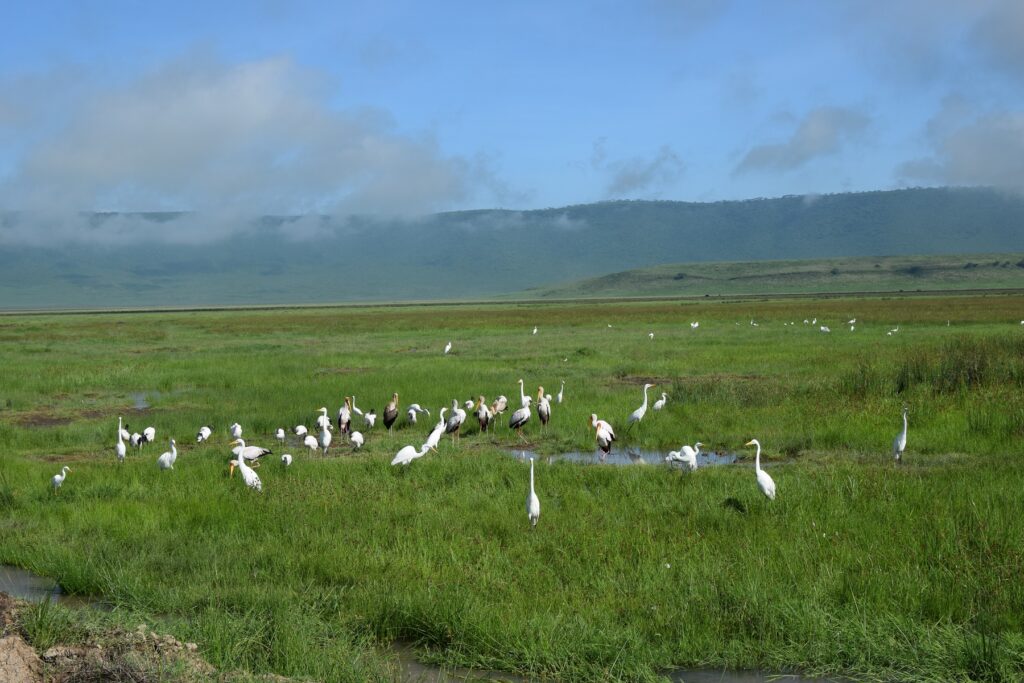
Rhino
Finally, we heard about a Rhino sighting. It was an area where the roads were not paved and muddy, and Benno had decided not to go earlier in the day. But now, with the confirmed sighting, Benno was motivated. Also, the fact that other cars had made it was reassuring.
The rhino was far from the road, but we could see it clearly. There are about 20-30 rhinos in the crater, and we were happy that we could see one.
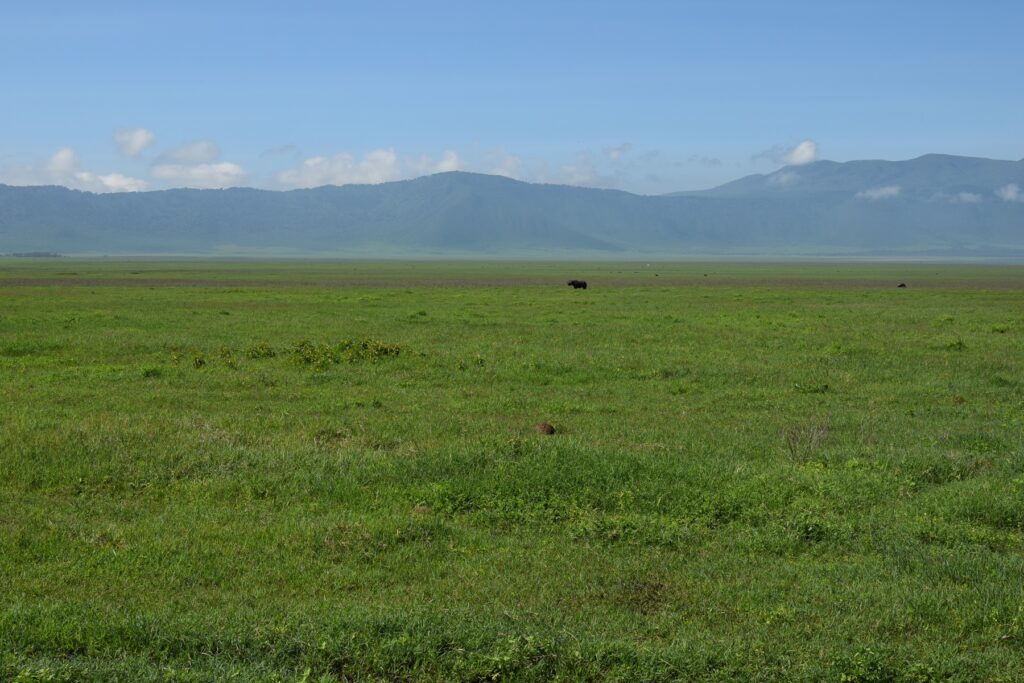
After the lunch break at the picnic spot by the lake, we drove out of the crater and back to Arusha. On the way, we stopped at the viewpoint.
On the drive back to Arusha, I referred to Benno’s book on all African birds and animals. With Benno’s help, I listed about 50 unique species (including the big five – Buffalo, Elephant, Leopard, Lion and Rhino) in the last five days. Here is the list of most of the animals and birds (probably missing a few birds) in alphabetical order –
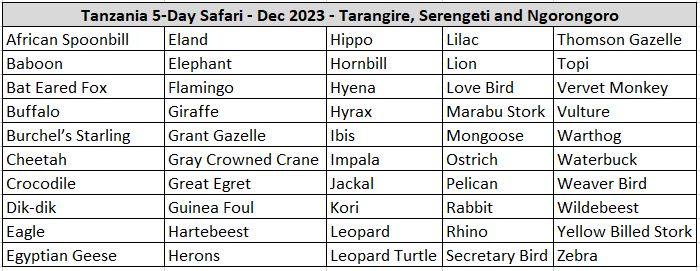
On the way to Arusha, we stopped by the African Galleria and bought some small souvenirs. The paintings and ebony wood crafts were beautiful but too expensive for us.
We were back at the Outpost Lodge in Arusha by 5 pm. The last five days of Tanzania Safari have been an incredible experience. We were out for almost 10 hours each day, either on the game drive or travelling. Benno made it a safe, comfortable and enjoyable experience for us.
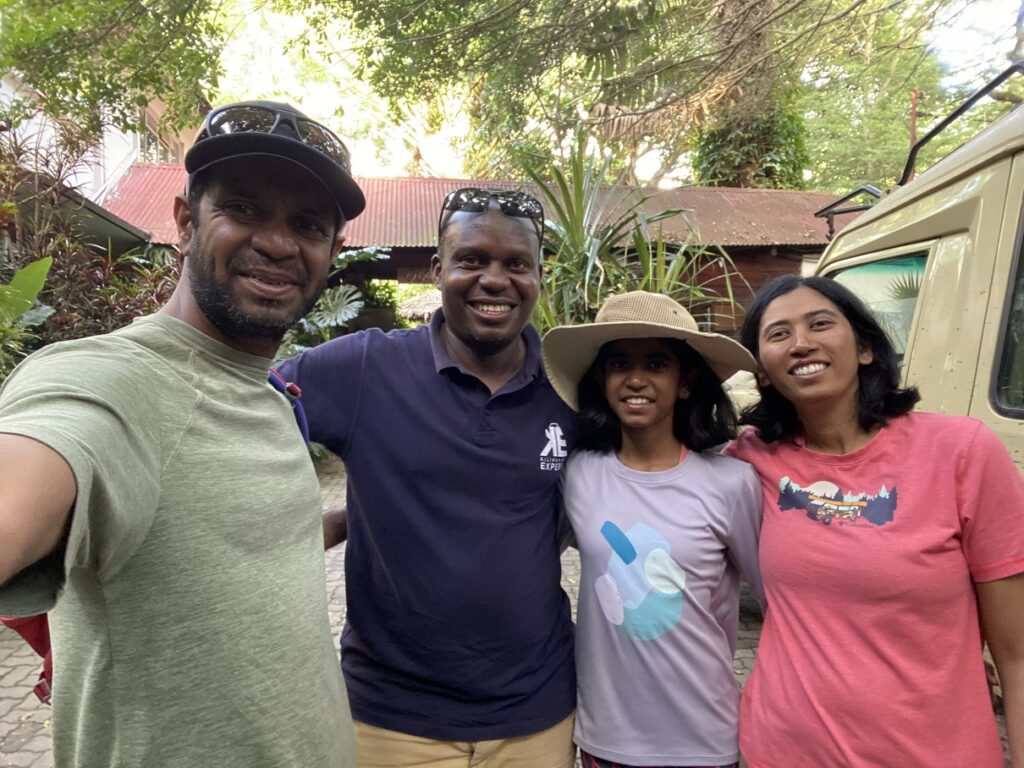
Maasai Market
The next day, our flight was in the evening, so we visited Arusha’s local Maasai Market (not exclusive to Maasai people). The lodge offered to provide a guide for a fee, but we decided to go on our own. It was about a 20-minute walk from our lodge. This market is in a gated property and has restrooms.
There are about five lanes and maybe a hundred small shops. The shops sold various paintings, t-shirts, arts and crafts, etc. Most of the items were very similar across shops.
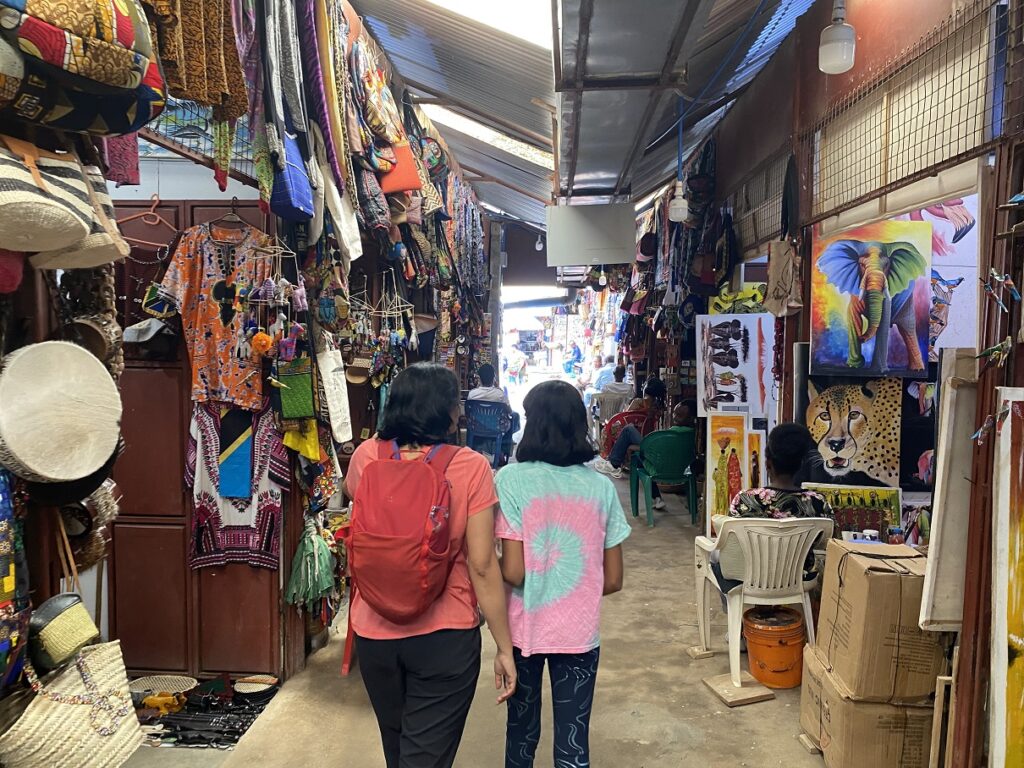
As tourists, we got a lot of attention, and everyone asked us to come into their store to “just take a look.” Based on the reviews, this was expected, and I knew the prices were highly inflated.
We were interested in paintings and were blown away by the quality of some of them. In a couple of stores, we asked about the artist, who was always their brother or someone who lived elsewhere. So we knew we were not buying any original artwork in this market. Finally, after some bargaining, we picked two paintings.
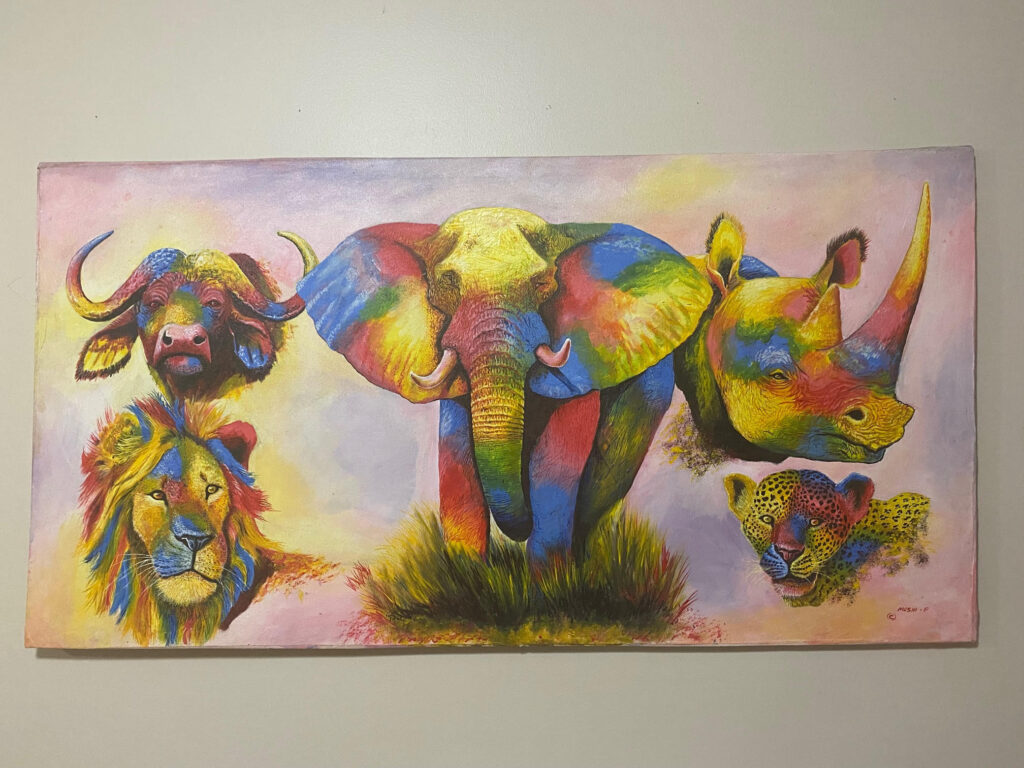
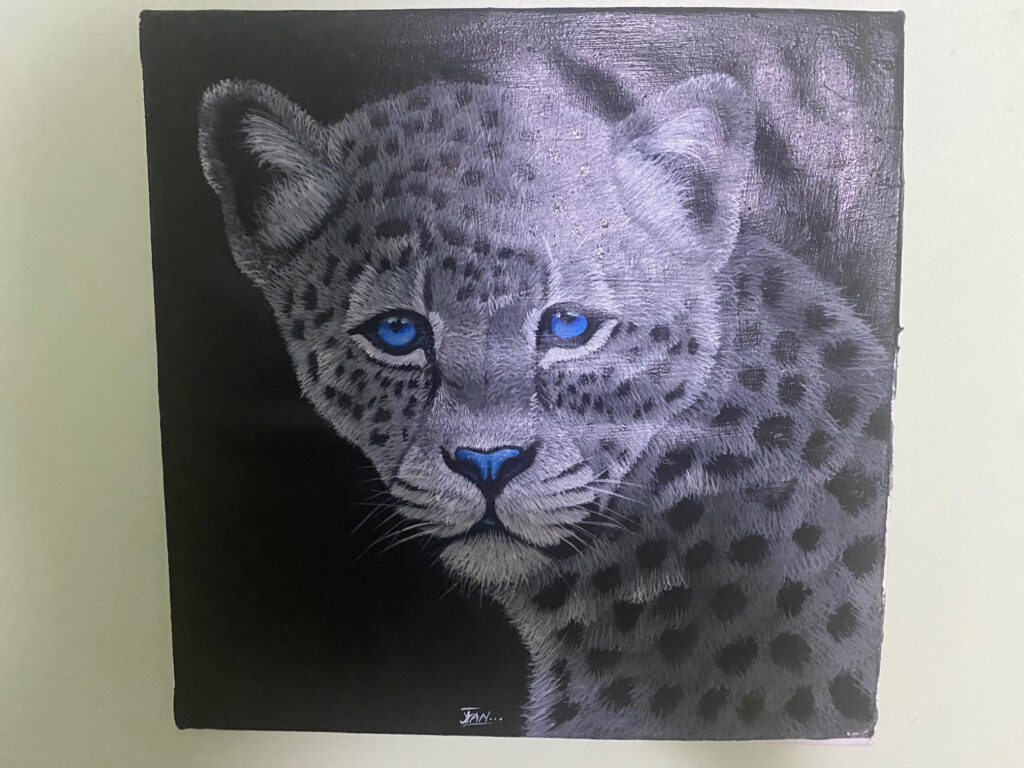
We were back in Vancouver on December 20. For the next few days, we were still in awe of our experiences on the Kilimanjaro Trek and the safari in Tanzania. Something we will all cherish for the rest of our lives.
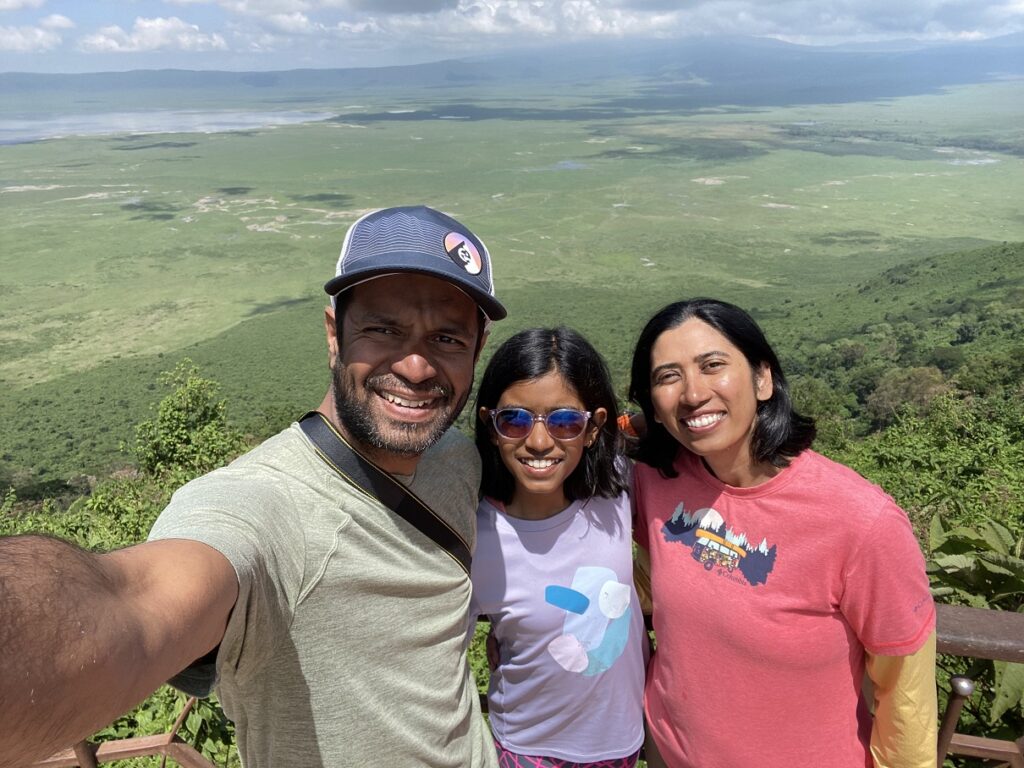
Resources:
Tanzania National Parks: Official Website
Lodges we stayed: Country Lodge Karatu | Signature Serengeti Luxury Tented Safari Camp | Ngorongoro Rhino Lodge
Kilimanjaro Experts: Safari
Disclosure: The links I have shared in the post and under the Resources section are not Affiliate Links.
Did you enjoy reading this post? Please subscribe to get weekly updates. Please share your feedback in the comments section below. Thank you!


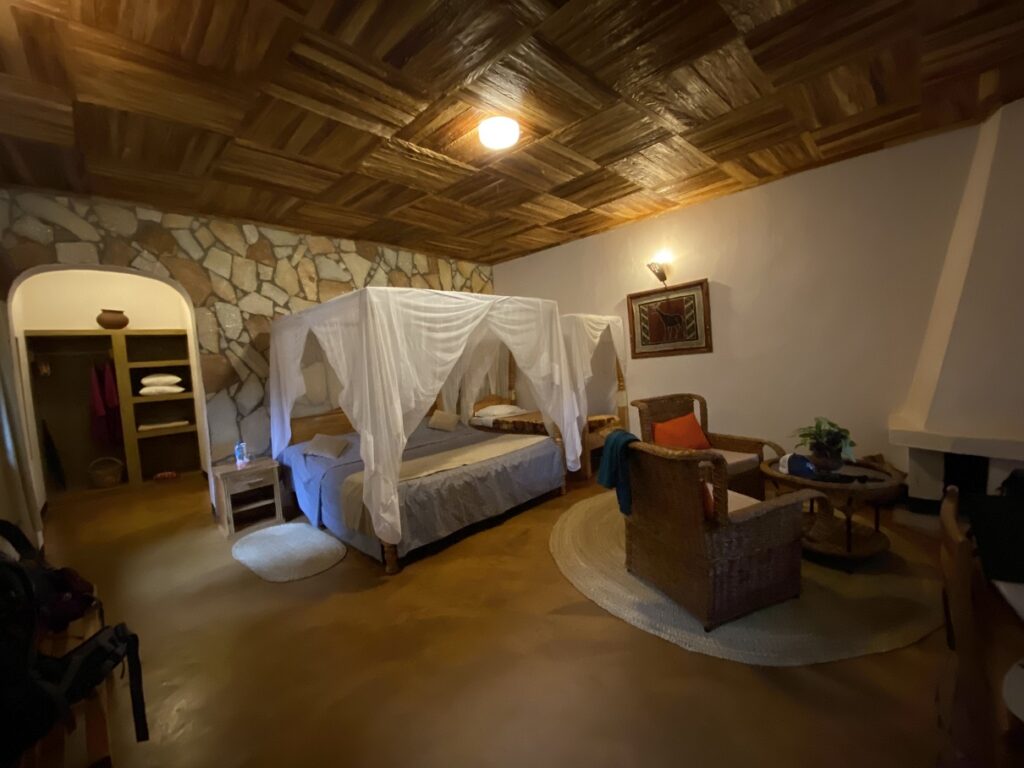
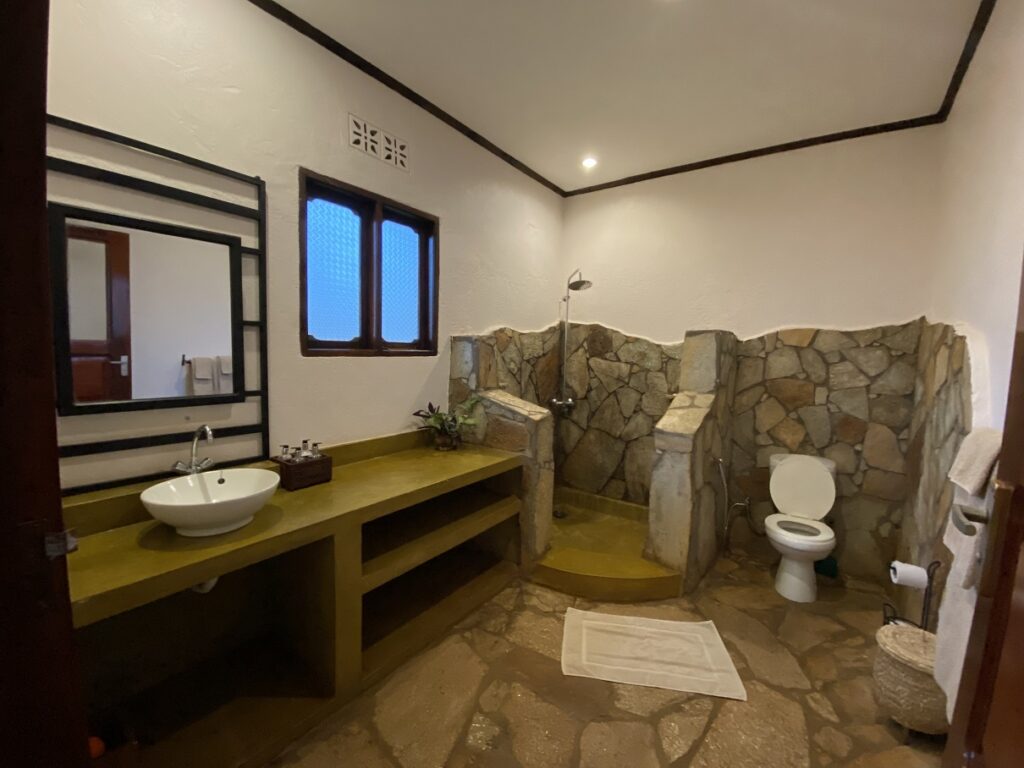
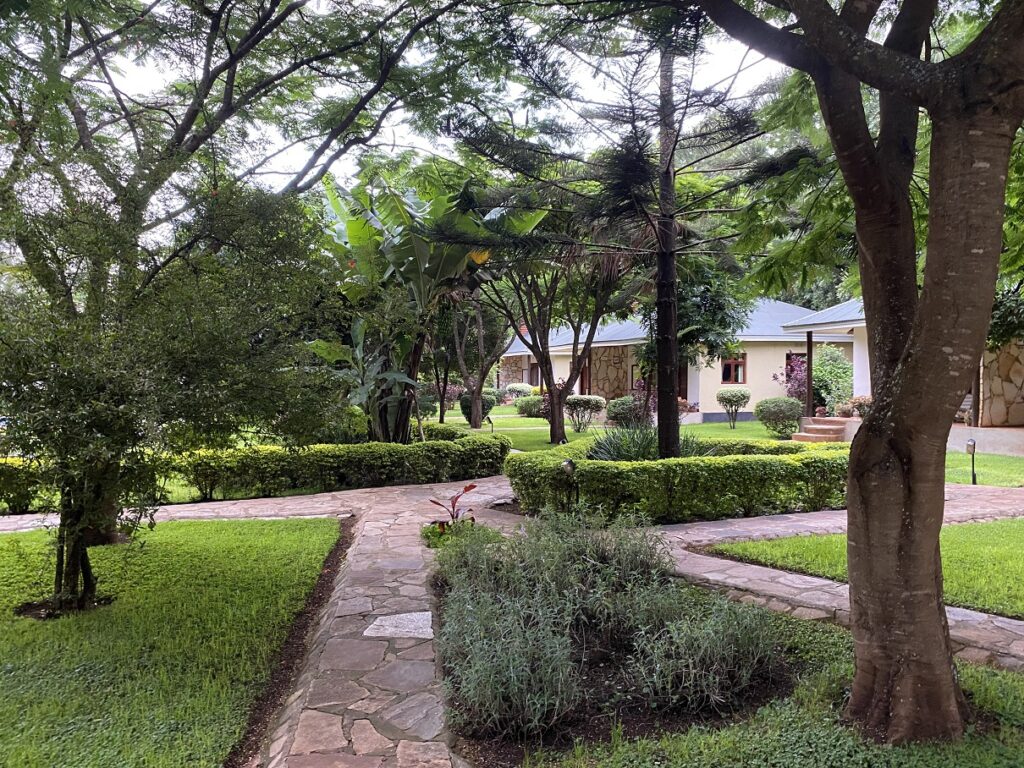
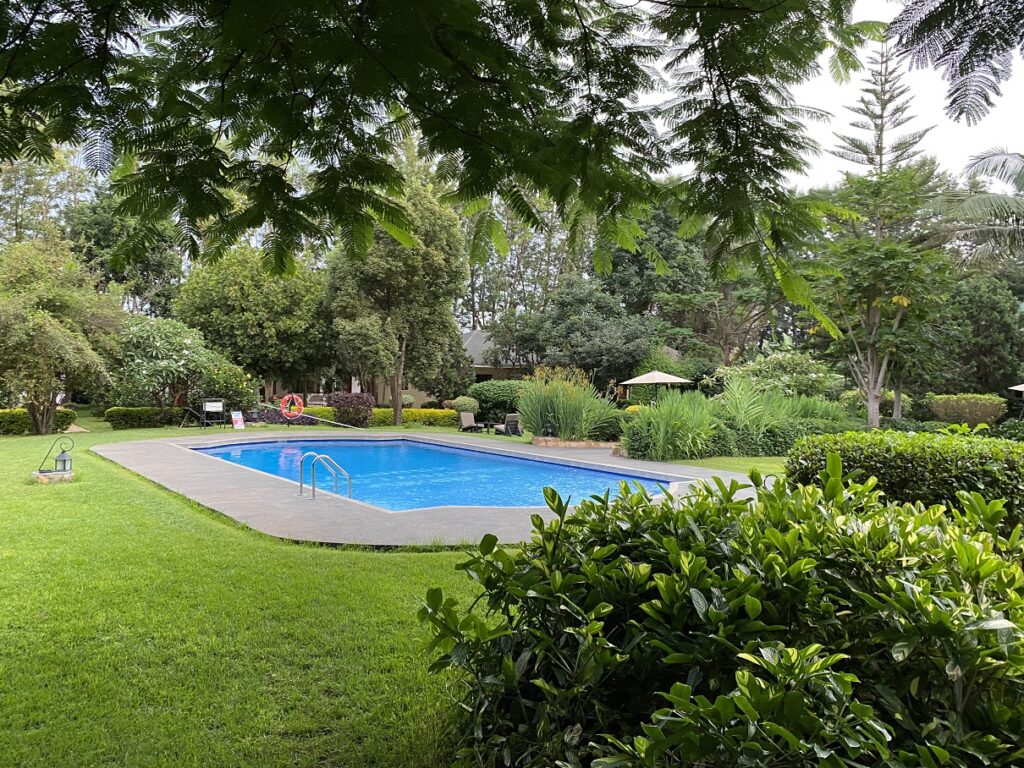
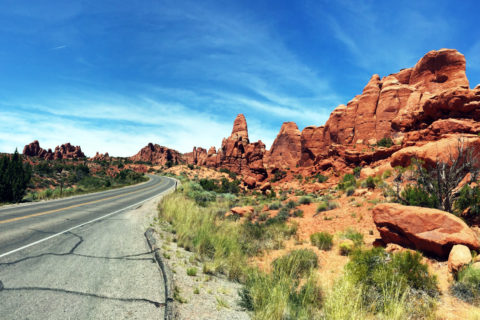
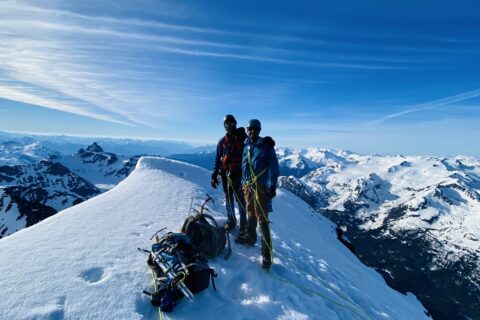
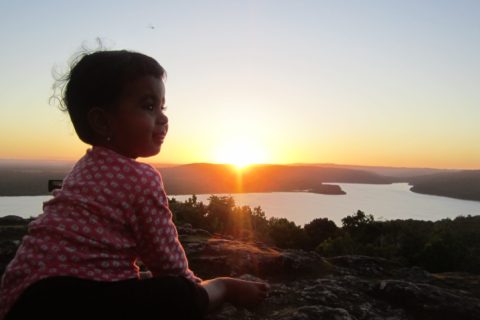
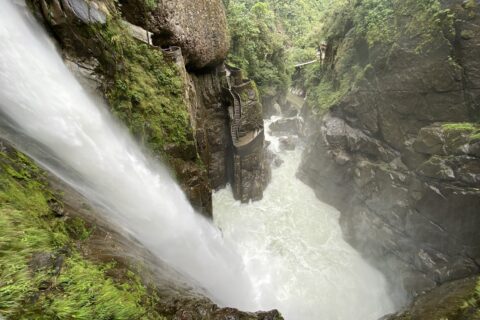
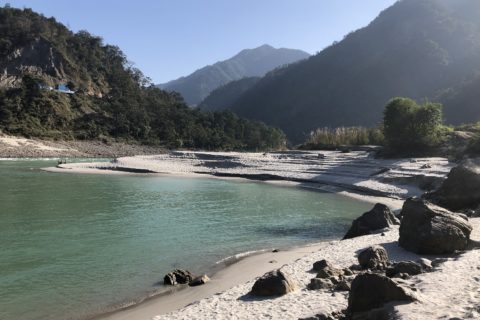

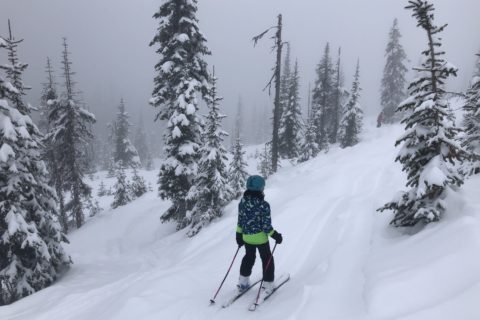
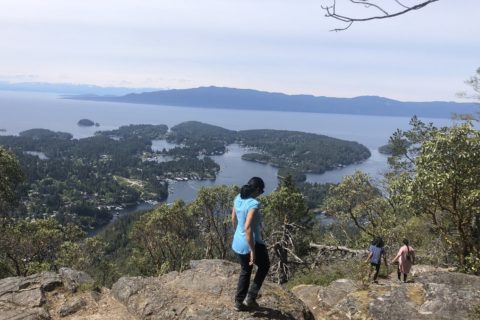
very Good
Nice blog, Shashi! The ‘Tower of Giraffes’ is pretty cool! Thanks for sharing this unforgettable trip with your readers. 🙂
Thanks Kedar. Tower of Giraffes, Dazzle of Zebras and Confusion of Wildebeests – pretty awesome!